
CO-EXECUTIVE
CO-EXECUTIVE PRODUCER OF ARCANE + PRODUCER & WRITER OF SEVERANCE SEASON 1, CO-EXECUTIVE PRODUCER OF
SEASON






CO-EXECUTIVE
CO-EXECUTIVE PRODUCER OF ARCANE + PRODUCER & WRITER OF SEVERANCE SEASON 1, CO-EXECUTIVE PRODUCER OF
SEASON










UPLIFTING RISING & ESTABLISHED FILMMAKERS + ENTERTAINMENT LEADERS
REGARDLESS OF AWARDS, EDUCATION, OR STATUS WE ALLUDE TO OUR OWN STORIES

Amanda Overton is an esteemed Executive Producer and television writer. She has led writers' rooms on multiple record-breaking series such as Arcane, Severance, Monarch: Legacy of Monsters, and more. She is an award-winning filmmaker.

Rippin Sindher is a fearless filmmaker who fuses sociology with cinema to ignite impactful conversations around justice and identity. Her short film, FLIGHT 182, is a finalist and winner of the CAPE x Janet Yang Productions x Julia S. Gouw Short Film Challenge.

Archie Panjabi made history as the first Asian actor to win a Primetime Emmy® for acting, earning acclaim for her role as Kalinda Sharma on the CBS drama The Good Wife. Her acting portfolio includes: Bend It Like Beckham, A Mighty Heart, & Under the Bridge.
JAMIL AKIM O’QUINN

- 43
Compton native Jamil Akim O’Quinn is a Black, queer, neurodivergent writer with a penchant for writing stories about characters in worlds where they don't fit in. He is a writer on CBS’s S.W.A.T. His other work includes: NCIS: Los Angeles & The Equalizer.

Elizabeth Ai is a Chinese Vietnamese American award-winning filmmaker, storyteller, and author. Her debut feature documentary, New Wave, premiered in competition at the 2024 Tribeca Film Festival, earning a Special Jury Mention for Best New Documentary Director.

Jacob Chandler writes about the rise of A24, an independent film and television studio known for its distinctive, often genrebending, and artistically acclaimed productions. How has A24 changed the game for studios and filmmakers across Hollywood?
BY: MARIA MURPHY

Maria Murphy writes a detailed review on One of Them Days, a comedy film directed by Lawrence Lamont and written by Syreeta Singleton. The film stars Keke Palmer and SZA as two friends who must scramble to find rent money.

Anusha Natarajan provides a deep analysis on the impact of AI and rising technology in relation to streaming. Learn more about how recommender systems are being utilized by studios in order to draw viewers in.
Milla Nguyen anecdotes about the time she went to New York City completely on her own. Deciding to attend the 2024 Tribeca Film Festival on a whim was one of the most spontaneous decisions she’s made. Take a look at the festival’s 2024 lineup.
UNDERRATED: UPLIFTING RISING FILMMAKERS & ENTERTAINMENT PROFESSIONALS

Nathan Xia is an award-winning filmmaker who’s breaking barriers. He is best known for his short, Adam’s Song, distributed by WongFu Productions. He is also an actor and singer-songwriter. He is an alumnus of Loyola Marymount University.
Fiori Carmen is a multi-faceted filmmaker from the Netherlands. Her directing work on her short film, Transpassing earned her a nomination at the Television Academy Drama College Awards. She is an alumna of Loyola Marymount University.

Dustin Muenchow wears many hats as a director and editor. An expert in crafting comedy and witty punchlines, he won the Special Jury Award at SXSW for his editing work on television pilot, Halfrican American. He is an alumnus of Loyola Marymount University.
Lu Cheng is a rising film & television composer whose work has been on CW’s The Flash, Arrow, Prodigal Son, and more. He currently writes and composes music for international short films, video games, and other media. He is a graduate of University of Southern California’s Master’s program in music.
FACULTY OF LOYOLA MARYMOUNT UNIVERSITY
LYNNETTE
PATRICIA MEYER PROFESSOR OF SCREENWRITING
GARY GROSSMAN PROFESSOR OF SCREENWRITING

Hello! My name is Milla Nguyen, the Editor in Chief and founder of Allusion Magazine. I’m beyond excited that you’re here. I am proud to say that this is our second issue. A couple of years ago, I thought of the idea for Allusion Magazine because I craved a sense of community, creativity, and purpose. Upon arriving to graduate school, I realized that it was hard for young filmmakers to get their feet through the door. Major publications mostly feature creatives who have high wealth, status, and a large social media following. I didn’t have this. Many of my peers didn’t either. Yet, I didn’t want to give up. At Allusion, I believe that everyone has a
right to tell their own story, no matter how big or how small. For our Vicarious Column, we interviewed many legendary filmmakers: Amanda Overton, Rippin Sindher, Archie Panjabi, Jamil Akim O’ Quinn, and Elizabeth Ai. All of these filmmakers have created stories that represent the human condition and subvert stereotypes portrayed in past media. For the Underrated section, we interviewed highly-successful rising filmmakers: Nathan Xia, Fiori Carmen, Dustin Muenchow, and Lu Cheng. Ranging from talented creatives to leaders in their communities, they have all positively contributed to the industry and to their peers. Next, our brilliant team of writers who contributed to the second issue: Jacob Chandler, Maria Murphy, Kurtis Williams, and Anusha Natarajan. I would like to extend my thanks to Evan Odinsoff and Michael Kokorine for photographing and capturing our interviewees.
I would also like to express my thanks to my team as a whole: Evan Odinsoff (Director of Visual Media), Kurtis Williams (Director of Content), Anna Lei (Director of Events), Anusha Natarajan (Business consultant) for believing in the vision and for wanting to make the world a better place. This magazine and its message would not be what it is today without my key team of members and friends. Finally, a tremendous thank you to Weiko Lin, my mentor and Faculty Advisor, for being the professor who told me that our goals are worth accomplishing. When I told him that I had doubts about my idea and our mission to help the community, he encouraged me to keep pushing forward. And I’m so glad we did.
Thank you to all the faculty members who participated in this second issue. It is an honor to scratch the surface of your stories, and we are thankful to learn from educators who care so deeply about the LMU community.
Last but not least, thank you so much to our fellow peers, our supporters online, and our readers all over the world. This second issue was made with love, enthusiasm, and resilience. We hope you enjoy our second issue and we’re excited to bring you many more.
Sincerely,

Milla NGUYEN







CO-EXECUTIVE PRODUCER OF ARCANE, PRODUCER & WRITER OF SEVERANCE SEASON 1, AND CO-EXECUTIVE PRODUCER OF MONARCH: LEGACY OF MONSTERS
CO-EXECUTIVE PRODUCER OF ARCANE, PRODUCER & WRITER OF SEVERANCE SEASON 1, AND CO-EXECUTIVE PRODUCER OF MONARCH: LEGACY OF MONSTERS

OVERTON:
Story by: Milla Nguyen
Photography by: Evan Odinsoff
Videography by: Michael Kokorine
AmandaOverton’sBiography: Amanda Overton began her career as a molecular biologist. Later, she realized she wanted to contribute to the arts and utilize her power of storytelling to open people’s minds. She decided to pursue her passion in film and television, eventually graduating from USC’s School of CinematicArts.Duringhertimethere, she created a teenage lesbian superherowebseries, Edge of Normal. Over the course of her career, she has worked in various writers' rooms and hasservedasamulti-facetedproducer as well. Her portfolio includes HBO’s True Blood, and True Detective, Amazon’s Transparent, I Love Dick andTheTick,Netflix’s MarcoPolo,


Umbrella Academy, and more. However, most people know her for her legendary stint at Riot Games and Fortiche during the development of Arcane, a recordbreaking animated television series based on League of Legends. She is also a producer and screenwriter on Apple TV’s Severance season 1, followed by her time as co-executive producer of Monarch: Legacy of Monsters.
Author’s Note:
I had the most incredible opportunity to interview Amanda Overton, an esteemed producer and screenwriter.Honoredisnotenough to describe how I felt when conductingthisinterview.

Not only has Overton worked on lifechanging stories, but she is humble and light-hearted about it, too. It is clear that her immense dedication to unconventional stories, LGBTQ+ representation, and the cultivation of diversity will significantly contribute to how audiences see characters portrayed on screen. As an enamored viewerof Arcane,theessentialpartsof the show move beyond the fantastic art, original music, and worldbuilding. While all of these aspects are amazing to see, the show's heart is centered on the characters’ relationships. Between Violet’s unrelenting redemption, Caitlyn’s fierce love, and Jinx’s paradoxes, audiences witnessed a universe they didnotknowwaspossible.Theydidn’t
know they could relate to these characterssointimately.Overtoncarries this spirit within all her work, using her pentodrawaportraitofhumanity,orat least, a better understanding of it. Her plans for future work are exciting, loud, and full of characters that break out of theirownmold,“Pow-Pow”style.
AmandaOvertonwasbornandraisedin Colorado.Sherecalledcampingwithher family, hiking, and skiing throughout her childhood. She said, “Growing up there was active, joyful, and positive for me.MybrotherandIwouldskiandride mountain bikes everywhere. It was a great experience.” In high school, she worked at a movie theater as a projectionistsoshecouldseemoviesfor free. In her spare time, she also played video games. While the media she consumed was entertaining, she didn’t see many Queer relationships that were portrayed multi-dimensionally onscreen.Thisthoughtstayedwithher.
Later, she attended UC San Diego for college, where she studied molecular biology and worked at a genetics lab. Overton spent two years mapping genes in a plant for a research project, which feltverytedioustoher.


Whileshedidnotstayinthegenetics field, she wanted to contribute to humanityinadifferent,creativeway. She decided to attend USC’s School for Cinematic Arts to pursue her master’s degree. She created a web series called Edge of Normal for her thesis project, something no one had previously done before. She was heavily inspired by Angela Robinson’s D.E.B.S, a feature film that centered queer leads and queer romanceswithoutatraumaticback-
story. Overton reached out to the producer of Robinson’s next film, leading to an internship and assistant position under Angela Robinson. Over the next six years, Overton worked as a script supervisor on various television showsandfeaturefilms.
From there, her career skyrocketed. Arcane, the animated series based on Riot Games’ League of Legends, was a critical and commercial success, with both seasons receiving near-perfect scores on Rotten Tomatoes. It was also a global phenomenon, reaching the top of Netflix's charts in numerous countries and won a Primetime Emmy for Outstanding Animated Program as well as multiple Annie Awards. She recalled being asked to join the development team for Arcane. While at the drawing board with the writers’ room, she wanted the creative choices to feel intentional and interwoven, especiallywhenitcametothepoliticsof the world and the power dynamics between the characters. She said, “In Runeterra, this is a world where magic dictated the power structure. We could imagine a world where racial and gender hierarchies don’t exist like they do in our reality. Characters weren’t judgedforwhotheywantedtolove.”


Overton has strongly advocated for multi-dimensional LGBTQ+ representation in stories. She mentionedhowshewastiredofseeing the same coming-out stories and traumas. She elaborated, “Alex Yee and Christian Linke, the other showrunners, knew that Caitlyn and Vi would be endgame. I knew I could help tell that story. I’m proud of what wedid.Peoplepouredtheirheartsand souls into it, especially into the intimatedetailsofthatrelationship.”
Diving deeper into the show, she explained that the Arcane scripts were not typically formulaic. For example, the first three episodes of season 1 focused on Violet and Powder as children and their complicated past, a choice that most network studios would advise against. When it comes to the writing, Overton said, “What makes good writing is strong emotions. Sometimes, when you feel uncomfortable, you have to lean into that. You want people to have a visceral reaction when they watch your work. I was reluctant when Christian Linke pitched that Vi should hitPowderattheendofepisodethree. Ivoicedmyconcerns.
Then, I realized that this moment is what defines Violet’s life. She has to make up for it. In season 2, Caitlyn hits Vi. We see they have all made mistakes,andsuddenly,youdon’t feel so alone in the world anymore.” Overton specifically wrote the episode; “Everyone Wants to be My Enemy” in season 1. We discussed what themes were most important to her when building out the episode's story. She said, “When you put together people who are so different from each other, you have to find a way for them to respect each other. For Vi, she’s had to fight for every scrap her whole life. Caitlyn is a Kiramann; she’s had everything handed to her. I look for the spine of the show. In this case, it’s about two sisters who are trying not to repeat the mistakes of their father figures and end up on the opposite sides of a war.




Caitlyn and Vi are also on opposite sidesofthatsamewar.”
I asked if there was a memorable moment she had with fans after the show was finished. She said, “I saw the finale for the first time in a stadium with thousands of people. They gasped, they cheered, they cried. They were on the edges of their seats. It was gratifying to see.” She also attended Comic Con in Brazil, where she was interviewedonstageabout Arcane.She vividly remembered seeing a giant mural of the characters and speaking abouthervastportfolioofwork.
With the new announcement of future Arcane seasons and new characters, I asked what Overton was most excited for. She mentioned she wanted to explore Freljord, a kingdom in Runeterra ruled by a matriarchy. She said, “I’m also interested to see what Ionia is like. That area is inspired by Eastern culture. I do Kung-fu and Taichi. So seeing that on screen would be socool.”

Amanda Overton produced the widely popular television series Severance, created by Dan Erickson and directed by Ben Stiller. Severance surpassed Ted Lasso and other popular Apple TV+ series and set new streaming records for the platform. Overton said, “Severance was incredible. In the writers' room, we wrote ten episodes in total, but the network asked us to make nine the finale. The suspense of the reveals made it worth all the work.”. Delving deeper into the show's themes, Overton asked, “If we severed someone’s memories, what remains?”. She was specifically drawn to Burt and Irving’s relationship, two older gentlemen who work at the Lumon corporation who have never been in love and don’t know what homophobia is. She said, “With those two, we were able to write a sweet high school romance between these men. I’ve never seen that on television before. That was astandoutmoment.”

Monarch: Legacy of Monsters Monarch: Legacy of Monsters is an American television series created by Chris Black and Matt Fraction and produced by Legendary Television. BasedonGodzillabyTohoCo.,Ltd,itis the sixth installment and second television series in the Monsterverse franchise. The series stars Anna Sawai, Kiersey Clemons, Ren Watabe alongside Wyatt Russell and Kurt Russell in the shared role of Lee Shaw. Overton was the co-executive producer on the show. I asked her about her experience working with cultural consultants and bridging aspects of Asian culture into the story. She said thewriters’roomwasethnicallydiverse which helped broaden perspective. At the start of the story, Cate (Anna Sawai) and Kentaro (Ren Watabe) are half-siblings who embark on a journey tofindtheirmissingfather.

Overton mentioned the writers had to find ways to connect the siblings’ memories to their father. She continued, “In Japan, a lot of television advertisements have a little jingle or song. I asked our Japanese consultants about their experiences growing up, and they confirmed that people in Japan widely knew these commercial tunes. In the show, the siblings would sing these jingles, too. It was a funny, heartfeltthing.”
When Overton is not on set and not in the writers’ room, she enjoys travelling to gain perspective. In between her college and graduate school years, she moved to Italy, where she took in the culture, learned the language, and immersed herself in the history. She said,“Travellingallowsyoutoseethe

world outside your own. All artists and filmmakers can gain perspective. In Europe, they invest time and money into preserving priceless works of art, which we don’t do anymore. At the same time, their culture is so different than here. Not all of it is great. In my opinion, traveling allows you to reaffirm what you had and encourages youtoleaveacertainmindsetbehind.”
In her free time, she enjoys being outside and breathing in nature. She loves to spend time with her family, specifically her son. Even to this day, shefindsherselfplayingvideogamesto gain inspiration. She said, “The action of suturing yourself into the main character of a video game keeps you on the edge of your seat. You’re responsible for keeping them alive. There’s something satisfying about that experience.”
It was also an honor to photograph and capture Amanda Overton at Riot Games headquarters in Los Angeles. While we talked with her about the show, we walked through themed offices, past statues with props, and character posters of Riot’s games. In the employee gaming room, she sat on a stool, punching the buttons of an arcadegamewithasmileonherface.
As the entertainment industry continues to change, Overton emphasized the importance of training next-generation filmmakers. She said, “Studios should see that we have to invest in new voices through apprenticeships. I try to mentor young writersandteachthemonhowtowrite scripts. There’s only so much of my story I can tell. I need others to tell theirstoriesandIwanttosupportthat. Themorediversestories,thebetter.”
Overton is booked and busy. She has an original science fiction pilot at Netflix in the works. She will also be co-showrunning a new animated series forPrimeVideo.
Finally, I asked if there was anyone she would like to thank for supporting her in her career. She said, “My mom. She ismybestfriendandbiggestemotional support. She stuck with me and fights for me; however, I have been different. Anyone I can help fight for is because ofher.”













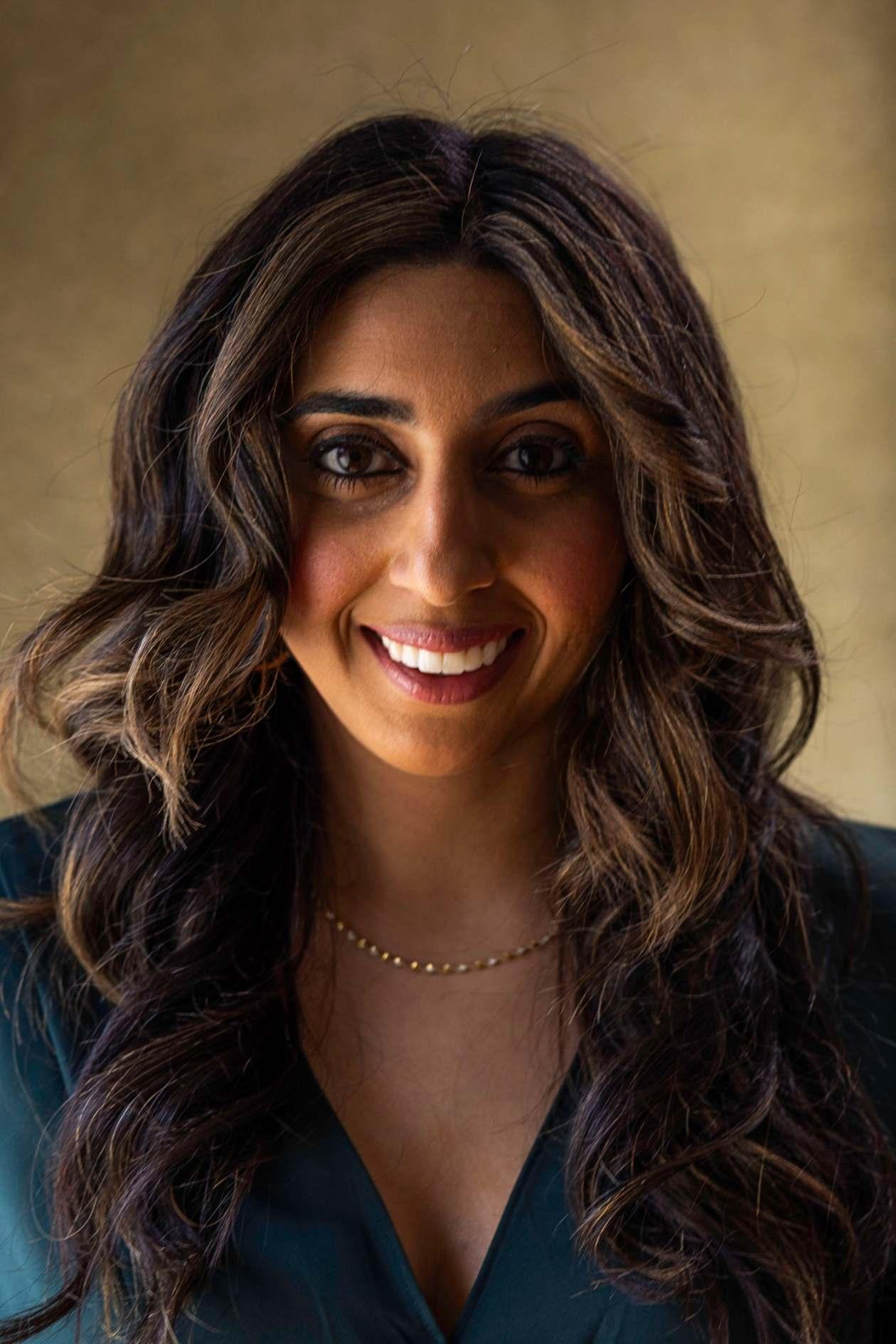

EMMY A W A RDWINNING
EXECUTIVE PRODUCER OF FLIGHT 182 EXECUTIVE PRODUCER OFFLIGHT 182
The first Asian actor to win a Primetime Emmy® in history
The first Asian actor to win a Primetime Emmy® in history
STORY BY: MILLA NGUYEN
PHOTOGRAPHY BY: EVAN ODINSOFF
VIDEOGRAPHY BY: MICHAEL KOKORINE
Rippin Sindher’s Biography:
Rippin Sindher is a fearless filmmaker who fuses sociology with cinema to ignite impactful conversations around justice and identity. Her work is bold, unflinching, and deeply personal—rooted in her perspective as a Punjabi-Sikh woman and driven by a passion for stories that inspire social change. A two-time Bank of America Big Tell Award recipient, she earned Congressional recognition for SEVA, her anti-hate documentary on Sikhs in America, and followed with ZONE, which exposed California’s legacy of redlining. Her narrative shorts, Broken Drawer and The Hideout, explore the intricacies of human connection and have won acclaim on the festival circuit. In 2023, she won the Julia S. Gouw Short Film Challenge with CAPE and Janet Yang Productions for FLIGHT 182, a gripping true-crime drama executive produced by Emmy® winner Archie Panjabi. Sindher was elected Vice President of the RISE Council (Dan Lin’s accelerator for POC creators) and was honored with UCLA’s Women Leaders Award for her impact as a storyteller. She is also the founder of KAUR Creative, mentoring teen girls, and co-founder of Sindherella Co.
Archie Panjabi’s Biography:
Archie Panjabi made history as the first Asian actor to win a Primetime Emmy® for acting, earning acclaim for her role as Kalinda Sharma on the CBS drama, The Good Wife. Born in London to Indian parents, her global perspective and cultural heritage deeply inform her work. In addition to her Emmy win, she has received an NAACP Image Award, multiple Emmy and SAG nominations, and a Golden Globe nomination. She earned the EFP Shooting Stars Award at the Berlin International Film Festival and the Chophard Trophy at Cannes for Female Revelation of the Year. Known for her magnetic screen presence, Panjabi has starred in a wide range of acclaimed projects, including Bend It Like Beckham, A Mighty Heart, Run, and Hulu’s Under the Bridge. Her fearless approach to complex, multidimensional characters has made her a standout in both Hollywood and international cinema. Off screen, Panjabi is a dedicated humanitarian. She is an outspoken advocate for global health initiatives, including polio eradication, and supports human rights causes such as combating genderbased violence and amplifying marginalized voices.



It is an honor to highlight Rippin Sindher and Archie Panjabi as two of our Vicarious Column guests for our second issue. Rippin Sindher is soaring to new heights with her latest project, FLIGHT 182, a winner of the Julia S. Gouw Short Film Challenge presented by CAPE and Janet Yang Productions. When she’s not directing on set, Rippin Sindher is a dedicated leader who strives to mentor young filmmakers. She also contributes to several filmmaker communities: KAUR Creative, Sindherella Co., and Rideback Rise, all of which have empowered many creative careers. When Sindher and I conducted the interview, she spoke about the essence of unity. To make her projects happen, her team must be one with each other. When she founded her own production company, Sindherella Co., she had to be in sync with her brother, who is her co-founder. Most of the time, she has to be in tune with herself when writing or directing. Her films display what it means to be human, what it means to be Asian, and what it is like to confront otherism. The common thread weaved in this tapestry of work is the concept of strength and healing from grief. Rippin Sindher has always carried herself with a sense of poise, eloquence, and humility. In her unique directing style, her actors’ performances utilize the power of poise to draw you in as as a viewer. In real life, Sindher draws us in when talking about her passion for filmmaking, providing an intimate lens of what kind of person she truly is.
Rippin Sindher was raised in Selma, a farm town in California. As a child, she didn’t know how to define her passion for cinema. Most of her memories involve watching Indian films with her parents or participating in her town’s community theatre group. It wasn’t until she arrived at UCLA that she began to discover her passion for the arts and a potential career path in it. She majored in English and sociology, which allowed her to combine writing with an understanding of human behavior. She said, “I always had a zest and curiosity for life, to see what was beyond my upbringing, but never lost sight of where I come from.” From then on, Sindher chose filmmaking as a career. She began working for the Directors Guild of America while creating her own content.


Rippin served as a directing fellow and consultant on S.W.A.T. for an episode that explored the story of Air India Flight 182. She’s been a finalist for several prestigious industry programs, including the Sony Directors Program, Shondaland Women’s Directing Mentorship, Sundance New Voices Lab, AFI DWW+ and Lena Waithe’s Rising Voices. When we discussed the role of fellowships and mentorships, she emphasized their importance in shaping her path: “All of these programs are access points to build relationships and keep honing your craft.” She was also candid about the setbacks behind the scenes, admitting, “I’ve received so many rejections over the years. There’s so much pressure to do it one way, but what I’ve discovered in reality is that there are multiple ways to arrive at the same destination.” When she shadowed on the show Ratched through the Ryan Murphy HALF Initiative, she spoke about the ability to practice and manifest. She said, “The biggest challenge is that not too many people look like me in these spaces. There’s no anchor image to refer to. However, when I do these programs, I know that I have what it takes to do this job. To run a set efficiently. I’m sure of it. And it’s what keeps me moving forward even when I get a no or an almost.”


The Making of FLIGHT 182 featuring Executive Producer, Archie Panjabi
Rippin Sindher is most known for her short film, FLIGHT 182. The short is a winner of the Julia S. Gouw Short Film Challenge presented by CAPE and Janet Yang Productions. As she develops the feature-length version, she continues to conduct deep research on the true tragedy of 1985, a flight en route to Delhi that went off the Irish Coast when a bomb planted inside of a suitcase took down the aircraft. Sindher opened up about having a relative who lost his life in the tragedy and why she is so passionate about it. She said, “This was a global tragedy that impacted families everywhere, and yet, it did not get the media coverage needed for the world to call attention to it. My wanting to make this film comes from a deep place to understand parts of history that have been erased and resurface hard conversations through cinema. I chose to make this a narrative with a universal message of family and drop the viewer into a moment of profound dilemma.”
Sindher recalled when Archie Panjabi, the Emmy® Award-winning actress and producer, signed on to be an executive producer of the short. Sindher said, “I first saw Archie when she received the Icon Award in Canada at iSAFF and spoke about her visceral work on Under the Bridge about the Reena Virk story. I will never forget her speech, and yet, little did I know she had asked festival organizers to watch my film because she knew of this historical tragedy.” In response, Panjabi remarked, “FLIGHT 182 exceeded my expectations, and I couldn’t stop thinking about the film for days. I told Rippin she needed to get this story out in the world far and wide, and I wanted to support her in every way possible.” The film has screened at several Oscar-qualifying festivals, with Sindher and


Panjabi now setting their sights on an Academy Awards campaign. The pair spoke about the film’s universal appeal and how this year marks 40 years since the tragedy. Throughout the conversation, it was clear that Sindher and Panjabi had a powerful, glowing friendship. A connection that rose beyond the film.
Delving deeper, Rippin Sindher and Archie Panjabi are strong advocates for female empowerment through AAPI-led projects. I asked, “Why is it important for AAPI women to support each other?” Sindher mentioned the significance of perspective. She said, “I want people to know they are enough in this world and no matter the limitations, they can determine their own path. Looking back, women have played a huge role in supporting my dreams and being Punjabi is such an integral part of who I am. I want people to know you can integrate all facets of yourself into your art and live in full expression. As filmmakers, we have to pay it forward. It’s a testament to people like Archie who broke through these barriers in the first place.”
Panjabi elaborated, “My acting career is a tribute to my mother. I had this burning desire to act on screen because there wasn’t anyone who looked like me. In my opinion, there’s so much satisfaction in mentoring young people. No one succeeds without failure or mentors.”
Wrapping up the conversation, Sindher and Panjabi emphasized their desire to educate audiences with FLIGHT 182. Sindher said, “Not a lot of people know this, but this tragedy was the largest aviation attack before 9/11. It was like a domino effect after that. The feature film version will delve further into the mishandled evidence and race politics that played a role.”



Sindher was elected Vice President of RISE council, Dan Lin’s accelerator for POC creators. Sindher spoke about how Lin turned a space into an incubator to help filmmakers grow in their skills and craft. She said, “He created this one-of-a-kind campus complete with workshops and a sense of community to support filmmakers. I was at the forefront of developing the TV Summit during the inaugural year of the program.” At the TV Summit, Sindher worked with a team to bring forth keynote speakers, host innovative panels, and encourage networking opportunities. She is deeply committed to nurturing the community that RISE has built.
In her own time, she also founded KAUR Creative during the pandemic. She said, “During that difficult time when Covid first broke, we felt more fragmented than ever. I was on a production that got shut down. I started KAUR Creative so young girls and women could have a safe space. I wanted young teen girls to feel empowered and have a sense of sisterhood, think about their wellness and who they want to be in this world despite the setbacks.” Sindher reflected on how many of the girls who joined KAUR Creative were in middle school or their freshman year of high school at the time. Now, they’re accomplished graduates from Harvard or artists who have decided to start independent projects. She expressed the sentiment of building bridges and helping others within the industry. She said, “Who knows what would’ve happened if someone else had reached out their hand earlier in my career. Honestly, I wouldn’t have changed my personal journey for the world, but I think it takes courage to go beyond your cultural norm.”



Rippin Sindher and her brother, Gurinder Sindher, co-founded their production company, Sindherella Co., with a shared mission to tell bold, purpose-driven stories through independent film and media. “He has always been a constant in my life,” she said, “His mindset has always been, ‘don’t live in scarcity—invest in yourself and your community.” Together, the duo brings their ad agency experience to creatively direct and produce projects for clients, including Thermo Fisher Scientific, Nike, Etsy and more. Inclusivity is a key part of their operations. Both emphasize the importance of employing a diverse crew and providing fair, equal pay. Gurinder Sindher’s roles primarily include acting and producing, while Rippin Sindher contributes her directing and writing skills. One of their first projects together was a web series, The Man of Mystery, after Gurinder worked on Issa Rae’s The Misadventures of Awkward Black Girl. In the future, they are committed to investing in diverse, purposeful stories, as well as taking a chance on rising filmmakers.
Sindher is a well-versed master at directing narrative content, documentaries, commercials and theatre. I asked her about the directing mindset between narratives and documentaries. She explained that documentaries are rooted in trust. She said, “How truthful am I in treating the topic and subject while having a camera between us? How well does the subject trust me to give me access into their most vulnerable thoughts? You’re like a human investigator uncovering the topic in real-time.” Documentaries pushed Sindher to take a leap out of her comfort zone and forge ahead with an unplanned story, oftentimes picking up the camera herself to tell a story.



“Sometimes you can’t always prepare for everything, and improvising teaches you leadership and stretches you creatively when you don’t have all the resources you need. In many ways, it prompts a new level of tenacity.”
Sindher’s other short film, Broken Drawer, follows a man who must confront his childhood trauma hidden in a family heirloom and the aftershocks of a break-up. She said, “I wanted to challenge the boundaries of what it means to be masculine while exploring mental health.” She described the film as her love letter to loss and mentioned how deeply it represented her own grief of losing her mother unexpectedly at the end of Sindher’s senior year of high school. Sindher’s work seems to have many major recurring themes: resilience, unity and social change.
Last April, Sindher was selected for a directing intensive on Criminal Minds Evolution. She was mentored by veteran episodic director, Bethany Rooney, who advised her on this hands-on experience. Sindher was able to collaborate with many of the production departments, learn new directing skills, and build on her creative stamina.
Between film projects, Sindher has also directed stage plays, including An Evening Repast at the Morgan Wixson Theatre and most recently, Pyar Aur Coffee, which earned sold-out runs and heartfelt audience responses. After the final performance, she invited the audience to share personal reflections by writing love notes and placing them in a jar. “Afterward, my team and I sat together and read the notes for the first time. It helped us
understand how deeply the show resonated,” she said. “That’s who I am at my core: someone who thinks through the little things that elevate a creative project into a purposeful piece of art and an everlasting memory.”
Sindher emphasized how working in theatre has shaped her approach to directing, especially in blocking, collaboration, and drawing out the best in actors.
Sindher is now focused on the feature version of FLIGHT 182, a finalist for the Sundance Cultural Impact Residency. She’s also writing a one-hour family drama and a hometown feature. Recently signed to direct a campaign with a South Asian music star, she remains committed to telling culturally rich stories, and mentoring the next generation along the way. Ultimately, Sindher is a director and leader who will continue to invest in projects that create change and pass the baton to those she’s working with.
Finally, I asked if there was anyone she would like to thank for supporting her in this career. Sindher named her family, Harleen, cousin Kiran, childhood friends, CAPE and the UCLA community who have championed her passion from the start. She also credited veteran directors Bethany Rooney and Mary Lou Belli for encouraging her filmmaking journey during her time at the Directors Guild of America. And above all, she expressed deep gratitude to Archie Panjabi, executive producer of FLIGHT 182, for believing in both her and the story.




quinn award- w i n n i n g FILMMAKER award-winning FILMMAKER

a k i m Onniuq’ kalimaJ i m

“Mysongsreflectthehuman condition.Theroleofartisn’t justtoshowlifeasitis,but showlifeasitshouldbe.”

-HarryBelafonte

Jamil Akim O’Quinn’s Biography: Compton native Jamil Akim O’Quinn is a Black, queer, neurodivergent writer with a penchant for writing stories about characters in worlds where they don't fit in, who learn to adapt and thrive. O’Quinn has earned bachelor’s degrees in integrative biology and sociology from UC Berkeley, a Master of Divinity from Princeton and an MFA in screenwriting from Loyola Marymount University. As a child, he was groomed to be a Pentecostal megachurch pastor, but O’Quinn always preferred empowering communities through performance art and storytelling – not preaching. As a classically trained opera singer, former Armani Exchange model and Broadway performer, O’Quinn has lots of life experiences that can help spark creative ideas in anywriters’ room. As a writers’ assistant on The Equalizer and NCIS: Los Angeles, O’Quinn co-wrote/produced his first episode of television, 1414 - "Shame". He's was most recently staffed on Season 8 of S.W.A.T., where he wrote and produced episode

810 - "The Heights", now streaming on Paramount+. He looks forward to the next phase of his career as a professional writer.
Author’s Note:
Interviewing Jamil Akim O’Quinn was one of the best decisions we made for this issue. Right from the get-go, O’Quinn is a screenwriter and filmmaker who radiates passion, empathy, and strength. I first saw O’Quinn in person during a panel event at Loyola Marymount University. While that event took place over two years ago, his sense of fearlessness never wavered. The audience observed his lyrical way of speaking, in which he utilized the power of speech to bring out a sense of confidence and solace. When I had this conversation with him about his life story, it was clear that he wanted to make the entertainment industry a better place for all. He spoke about the spirit of community and his habits of self-discipline in his daily life, two key factors that are necessary for long-term success. O’Quinn is a powerhouse of many crafts, internally and externally. Jamil Akim O’Quinn said he refers to himself by his full government name. He further elaborated, “I do this because it serves as a reminder to bring my whole self when I walk through any door or room. No matter who’s inside.” This sets the tone for O’Quinn’s perspective of the world and of himself. He grew up in Compton, California, and was in love with the arts from a young age. He was trained in opera singing, participated in his church choir, and was a child actor, specifically as Danny Glover’s son in Gone Fishin’. Later in life, he discovered creative writing. All his lived experiences



allowed him to tap into a deeper purpose. He said, “I didn’t always fit in because of my background and what I was taught in the church. This ended up being my superpower. It’s my idea of unapologetic boldness and the courage to be okay with not fitting in. This is why my stories are unique.”
When O’Quinn was in college at UC Berkeley, he majored in integrative biology and sociology. For example, sociology taught him the art of negotiation and the ways of the human mind. Biology taught him critical thinking skills and problemsolving. These college experiences allow him to write fast-paced crime thrillers with heavy interrogation scenes and allow him to empathize with his characters. During his time there, he was also active in extracurriculars. A unique trait about O’Quinn is that he was trained in opera singing. He said, “I see opera singing in everything. Opera is storytelling. It allowed me to express my voice in spaces I wasn’t allowed in because of how I looked. Opera delivers comedy and melodrama in their most visceral forms.” O’Quinn spoke about the historical context of how enslaved Africans used opera to communicate with one another while overcoming their struggles to regain power. In his eyes, he felt opera was a way for his own humanity to be seen.
I asked O’Quinn if there was a moment in his life when he knew he wanted to be a filmmaker and a screenwriter. He recalled being at a church in Harlem, New York City. He was a fan of Harry Belafonte, a popular actor and activist within the Black community.

He met Mr. Belafonte at the church where Mr. Belafonte met Martin Luther King Jr. during the Civil Rights Era. Afterwards, O’Quinn wrote a script about Harry Belafonte, Martin Luther King Jr., and a character inspired by himself all meeting at this church to discover how to pass on legacy from one generation to the next. He always loved to write, but this moment with “Mr. B”, as he called him, was when his screenwriting journey began.
Later, he attended Loyola Marymount University for graduate school and pursued an MFA degree in screenwriting. He said, “LMU was the place where I could face my fears. It was the place where I felt affirmed in what I wanted to do. It boosted my self-esteem and self-confidence.”
Because LMU is known to be more inclusive rather than competitive, LMU’s environment allows students to grow at their own pace. O’Quinn mentioned a couple of professors who helped guide him, “Karol Hoeffner, Patty Meyer, David Clawson and Mary Kuryla made sure I was the best version of myself and on the page. That was my foundation.”
Additionally, O’Quinn served as a communications instructor at Bronx Community College. There, he taught students about the importance of self-worth and leadership skills. All of which he formed when he was a
student at LMU. Having been a student and having now taught students, he acknowledged the importance of proper education. He teaches at LA Valley College today. He said, “I want to pour into students who are longing to find theirway.”
Near the tail-end of his career at LMU, he wrote a script called And A Child Will Lead, which became a quarterfinalist in the Nicholl fellowship screenwriting competition.
O’Quinn was inspired by the historical events of Project C and The Children’s Crusade, when thousands of children and high school students peacefully protested segregation in Alabama and heinous police brutality ensued. In his work, O’Quinn is determined to highlight strong female characters who have opened doors for others on the page and in real life.
During his career, O’Quinn became a writers’ assistant on NCIS: LosAngeles where he co-wrote/produced his first episode of television, 1414 - "Shame". There, he described the writing process as fast-paced and relentless. It was exciting, but the turnaround was expected much sooner than most network shows. He said there’s a balance in deciding “which hill to die on.” “You must be consistent with the show’s main vision while also adding your own artistic spin on the episode.
You don’t want to shy away from the skills you know you have. You also want to be humble and knowwhen to ask for help.” He consulted with the director, his co-writer, and many production departments. After his time on NCIS: Los Angeles, he later worked on The Equalizer as a researcher and assisted the production as well.
Furthermore, he was chosen for the Paramount Global Writers Mentoring Program (2024-2025). He said, “The program enhanced what I was working on. I am able to talk, but how do I convey my passion for writing in as few words as possible? The program helped me craft my personal story and taught me how to best prepare for showrunner meetings. The truth of this industry is

that access is hard to get. These programs grant access to writers who can’t gain that access for themselves.” O’Quinn expressed the importance of learning from others who are in the same boat. The program allowed him to build a stronger network, which includes many of the Paramount alumni he still keeps in contact with today.
When O’Quinn finished the program, he became a staff writer on CBS’s S.W.A.T for Season 8. He wrote the episode “The Heights”. A theme that was consistent during all the chapters of his career was the establishment of teamwork.
For example, Jamil Akim O’Quinn spoke on a panel with his long-time manager, Jon Kee, and his lawyer at

LMU’s Call My People Event two years ago. He emphasized the importance of being represented by those you trust. He regards his manager as his friend, his brother, and someone who has been his partner in crime. He said, “Jon keeps me accountable. If I succeed, he succeeds. We succeed together. He sees all of me and the value of my work.”
I asked O’Quinn if there are themes that he would like to explore in a new work. He was vulnerable and open about coming to terms with grief in his life. He said, “The value of time is something I’m exploring. Time is currency. You can spend money, get a job, and work hard. Money comes back, but time doesn’t. What do people do with the time that they have?” Because of this sentiment, O’Quinn believes people’s values are uncovered in their darkest moments. He applies the same rules to his characters.
When we discussed staying passionate during the writing phase, O’Quinn mentioned how he looked up to multi-hyphenate, Shonda Rhimes. He quoted her, “Shonda once said, screenwriting is like hearing a hum. A hum that won’t let you sleep”. He is currently working on a new feature that hums in his mind. When I asked where he sees himself in the next two to five years, O’Quinn said, “I want to do what will make me feel alive in the moment, especially in my personal life. In my professional life, I want to make films and move up the ranks as a writer. I see myself being an executive producer level writer with financially lucrative deals to make tv and film that speak to the human condition. ”
Finally, I asked if there was anyone that he would like to thank for supporting him in his career. He would like to thank his great-grandmother for being the first person to introduce him to the arts. Second, his parents. He said, “They had so little, but they made sure all of their children could pursue what they were passionate about.”. He mentioned StanleyWayne Mathis, whom he toured with on the Book of Mormon, and ignited the passion for O’Quinn to embrace his worth. As mentioned before, Jon Kee, his manager. Finally, all of his professors at LMU who helped guide him, read his work, and mentored him on his journey.



WRITTENBY:MILLANGUYEN PHOTOGRAPHYBY:EVANODINSOFF VIDEOGRAPHYBY:MICHAELKOKORINE
Elizabeth Ai’s Biography:
Elizabeth Ai is a Chinese Vietnamese American award-winning filmmaker, storyteller, and author. Her debut feature documentary, NEW WAVE, premiered in competition at the 2024 Tribeca Festival, earning a Special Jury Mention for Best New Documentary Director and critical acclaim from The New York Times, Vogue, IndieWire, Los Angeles Times, and San Francisco Chronicle. She is the author of New Wave: Rebellion and Reinvention in the Vietnamese Diaspora and an Emmy winner and nominee for her branded content with ESPN and National Geographic. She created the original pilot for VICE/Munchies’ Bong Appétit, which was picked up for series. Her producing credits include Dirty Hands, Saigon Electric, Ba, and A Woman’s Work: The NFL’s Cheerleader Problem. An alum of Sundance, Tribeca, Berlinale, and Firelight Media, Ai’s work has been supported by the Center for Asian American Media, Cinereach, Ford Foundation, and the National Endowment for the Humanities.



Author’s Note:
ItisanhonortohighlightElizabethAias oneof our Vicarious Column headliners for our second issue. She is an industry role model for many groups: Vietnamese American filmmakers, female filmmakers, and independent filmmakers. During the interview, our discussion was like a breath of fresh air. A theme of future impact she heavily emphasized is community. I asked her about why she was specifically drawn to the Vietnamese community. She mentioned that the Vietnamese family members and friends she grew up with are all multidimensional. They are not solely defined by their traumas and the limitations of the past. In her documentary, New Wave, she portrayed a community that was able to move forward because of music, passion, and family. It was healing in a cathartic sense. The film punctuated that not every story is happy, not every relationship is perfect, but we are in charge of our own destiny. Throughout ElizabethAi’scareer,shehasbeendedicatedto telling niche stories that open our eyes to the truth and emphasize why resilience is significant.
Elizabeth Ai grew up in the San Gabriel Valley, California. She shared that while her mom and elders were focused on survival in the U.S., her childhood as a latchkey kid lacked structure, giving her a brazen autonomy that later defined her. Ai mentioned that she didn’t see filmmaking as a full-time career early on, but had bursts of passion for storytelling in general. Ai said, “My dream of being a filmmaker felt so removed from my family's working-class existence. Even watching movies in the theater was a luxury. I also loved escapingthroughbooks,throughstories.”
She attended the University of Southern California for college, majoring in business and political science, but later switched to creative writing. Still, she was hungry for more. After graduating, she recalled the times she held leadership positions in student government. She enjoyed having a purpose and being dedicated to serving the community. To continue her duty to service, she started working in the non-profit sphere, which broadened her perspective and shaped hercommunicationskills.

Ultimately, she engaged in experiences withpeoplefromallwalksoflife.
Finally, she decided that she wanted to use visual storytelling as a way to connect people. Also, as a way to educate audiences about untold narratives. She said, “As an independent producer, I didn’t realize how much storytelling it took. It’s not just about the piece of writing at the core of it. It can be about raising the money, refining pitches, communicating with a team, and holding it together. There’s even a narrative around the real narrative. You witness nuanced themes in how the charactersareliving.”
Her debut feature documentary, New Wave, is a historical coming-of-age documentary about displaced Vietnamese refugee youth who fled their country by boat and then in the 1980s redefined their identities in suburban Orange County, California, through New Wave music. I first saw the film at the Tribeca Film FestivalinNewYorkCitylast year. The film earned a Special Jury Mention for Best New Documentary Director at the Tribeca Film Festival, the 2024 Austin Asian American Film Festival AudienceAward,andtheGrandJuryBest Feature Award at Viet Film Fest. While the accolades are proof of Ai’s successful film, the impact of the documentary is even grander. When she first started drawing out the film's ideas, she explained, “My inspiration for this was when I was pregnant with my daughter. As a daughter of refugees myself, I was still navigating the relationship of motherhoodandheritage.
Iheldinalotofshame,andsuppressedit.I grew up in the 80s. I remember driving down Downtown L.A. I’d see unhoused folks and veterans with missing limbs as they held up signs saying ‘Vietnam War’. It wasaheavyword.“
She elaborated on the need to showcase the authenticity of Vietnamese people in a reallight,notanotherVietnameserefugee
war story that we have already seen. She said, “The Vietnamese people are always shown in compromised positions in films. Inferior. Defined by trauma. With New Wave, I was inspired by the teens who took care of me in the 80s. The big hair, funky outfits,andthemusic.”
Over the last year, New Wave has been screenedatmanyfilmfestivalsworldwide.I asked Ai if she had any memorable moments during these screenings. Ai said, “The fact that I can help bring shape and color to something these viewers feel is emotional. Of course, there has been support from a lot of Asian viewers. The crazy part is that non-Asian viewers will approach me afterward and tell me they felt seen. Being vulnerable is something everyone should practice so we don’t all feelsoalone.”
A few of her other works, specifically A Woman’s Work: The NFL’s Cheerleader Problem, caught my eye. Ai wrote and produced this documentary to showcase pay disparity issues and discrimination amongfemalecheerleaderswithintheNFL. On the outside, the general public assumes that NFL cheerleaders live a glamorous lifestyle and are paid large sums of money. This is not the case. Ai explained, “People don’t know. A lot of these cheerleaders didn’t get paid. It was presented to them as a volunteer position. They would spend so many hours practicing, and many of them rangefromageseighteentotwenty-five.
There was this misogynistic culture going on.”
Ai emphasized how shocking it was to read the facts and learn how these women were being treated within a multi-billion-dollar industry. Through the project, Ai discovered the truth all before the #MeToo movement. Ai and her team worked on the film during the movement, bringing a new, real-life component. Even then, they still received pushback from viewers who claimed that NFL cheerleaders were not significant enough to make a documentary about them. Ai elaborated, “There’s still a hierarchical mindset about which career is most important or which people matter the most over others. This documentary helped me see the internalized sexism. I had to reflectonit.”
While Ai is experienced in narrative and documentary filmmaking, she is also wellversed in the ad campaign space. While working at Evolve Studios, their projects were nominated and their team won an Emmy for a National Geographic campaign. We spoke about what the moment was like. Aisaid, “Wedidprofileswithmanyscientists and explorers in the field who were connected to National Geographic. I didn’t realize there were Emmys for branded content. I’m happy the team was recognized.”
She also worked as a director, writer, and producer at VICE Media and ESPN. She spoke about her time at VICE Media. She said, “One good thing about VICE is that we couldpitchideasintheroomeveryMonday. Icreatedashowcalled BongAppetit,whichis about the fun intersection of food and cannabis.“
Elizabeth Ai is an esteemed fellow of Berlin Talent Campus, Film Independent, Sundance, and Tribeca. While at the Berlin Talent Campus, she attended workshops and networking events in Germany. The other programs have provided her with grants and other tools necessary for independent filmmaking. She was a participant in the Sundance Catalyst program. She said, “I wouldn’t have been able to make New Wave without Sundance and all the people they brought in. I would meet younger filmmakers and be inspired by their work, too. It’s just about being open-mindedwiththeseprograms.”
Looking at how diverse her family and her roots are, she finds ways to honor her vibrant cultural heritage. Sometimes, that’s as simple as starting a conversation with those around her. She said, “Being Vietnamese, Chinese, and American, I try to celebrate what I remember. I don’t have a lot of heirlooms because my family has always been "on the run" for three generations. But I have a small altar with somephotosofancestors.

My daughter is navigating growing up mixed.Allofthishistoryisspecial.”
After New Wave, Ai has been reaffirmed in herownculturalidentity.Sheplanstoopen the doors for more communities through her storytelling, specifically by paying homage to the Vietnamese-Chinese community. In her next untitled project, she would like to explore themes of sisterhoodandfemalefriendshipsinaroad trip film, highlighting strong and diverse Asianfemalecharacters.
Finally, I asked her if there was anyone she would like to thank for supporting her. She mentioned one of her best friends and New Wave producer, Rachel Sine. She said Sine encouraged her to appear in New Wavesothattheaudiencecouldconnectto thepersonalstorymoredeeply.

written by: Jacob Chandler
Just over 12 years ago, a small new indie distribution firm put out their first feature film, A Glimpse Inside the Mind of Charles Swan III (2012) It flopped shortly after. A month later, their second feature Ginger & Rosa (2012) was released. It got a little buzz. That very same weekend, they released their first major success feature: Spring Breakers (2012). This small distribution firm was none other than A24. Flash forward to 2025, where the small firm has blossomed into one of the most prolific and recognizable entertainment studios in the streaming and Post-Pandemic Era. During the 2023 Oscar season alone, A24 garnered 18 nominations and nine awards across their six nominated films. It became evident to the industry that A24 is not only here to stay, but is also a key player in the entertainment landscape.

Many audiences aren’t aware, however, that A24 isn’t the small indie studio they used to be. While A24 has done an impeccable job at constructing and maintaining their indiestyle branding and culture, they have quietly expanded into an international powerhouse of entertainment. In just the last five months, the studio has released nine feature films, all of which are box office successes at minimum. This is how A24 took over Hollywood.
Back in 2012, three seasoned film industry professionals came together with one common denominator: they were frustrated with how traditional studios handled “unmarketable” films. Daniel Katz, David Fenkel, and John Hodges were inspired by the late ‘90s emergence of independent cinema, like Miramax and Fox Searchlight, but felt that talented voices staged at these studios weren’t receiving the light they deserved. Katz was driving down a motorway in southern Italy called the A24, where he had a moment of clarity. The idea sparked in his mind, and the rest is history.
After renting some off-street office space in Manhattan, they went to work. A24 acquired films like Spring Breakers (2012) from international film festivals by bringing the producers gift baskets full of gun-bongs and munchiesnacks; the movie soon played on over a thousand screens across the US. Spring Breakers became a critical success, and prompted an A24 shopping spree the following year. They purchased and distributed eleven features in their second year of operation, including Denis Villeneuve’s Enemy, Jonathan Glazer’s Under the Skin, and David Michôd’s The Rover. They took to unconventional methods of marketing and distribution, from gun-bong gift baskets to illegal Tinder chat bot profiles based on characters from upcoming releases. Essentially, they were disrupting the industry and creating “waves” that spread the name of A24 across the industry and to all the current powerplayers. They soon began campaigning their projects for awards, and the results were nearly instantaneous.
2016 was the year that A24 truly solidified its name. Actress Brie Larson won Best Actress for Room (2015), Amy (2015)
won Best Documentary Feature, and Ex Machina (2014) won Best Visual Effects. Nevertheless, the real turning point for A24 came only a year later: Moonlight (2016) won Best Picture, Best Adapted Screenplay, and Best Supporting Actor (Mahershala Ali). A24 backed the first film with an all-Black cast and the first LGBTQ-centered film to win Best Picture. Moonlight cemented a win, not just for A24, but indie cinema as a whole. Studios realized that audiences sought after authentic underrepresented stories, and A24 was at the top of the curve as a prestigious Oscar-level indie studio. A24 became the “cool” studio that made high-quality, edgy, emotionally powerful films. Younger audiences looked for the A24 logo in trailers when deciding what new movie to watch, while rising talents were attracted to new projects developing at A24. The studio continued to release successful projects, from horror hits like Hereditary (2018) to tear-jerker treats like The Whale (2022). However, one A24 film stands above all others: Everything Everywhere All At Once (2022). This genre-defying multiversal adventure swept the 2023 Oscars with 11 nominations, and is currently A24’s highest-grossing film. If people didn’t know about A24 before… they do now.
Perhaps the most brilliant aspect of A24 is their branding image. A24 started off as an down-to-earth indie studio that relies on creativity and emotion, and they’ve steadily maintained the integrity of their image since then. Before establishing themselves as a powerplayer, A24 had to curate their brand and develop their indie image. By uplifting the artistic visions of filmmakers and creatives, A24 quickly indicated that their films are moody, raw, and intense. They backed films that focused on subjects most other studios wouldn’t dare to touch, from gender identity to international stories to psychological dramedies. A perfect example is Under the Skin (2013), a commentary about morality and also a cautionary tale concerning judgement and prejudice. The script was shopped with multiple studios as a speculative script before A24 picked it up.

A large part of the raw creativity of A24 films is because the studio functions as a platform for directors and auteurs to express themselves freely. Auteurs like Ari Asters, Robert Eggers, and Greta Gerwig have some of their biggest hits with A24.

With the internet at their disposal, A24 wisely took their campaigns to social media to find their audiences. They utilized internet culture to construct an approachable brand, from lifestyle merchandising choices to internet-meme-formatted marketing campaigns. For example, a carousel horse shown in a trailer of We Live In Time (2024) went viral overnight for its goofy face; A24 embraced it by infusing it into their film marketing campaign through their own memes and merchandise.
Rather than posting normal clips and trailers on social media, A24 posts cryptic countdowns, memeable content, and behind-thescenes photos. Midsommar (2019) fans could purchase moviethemed designer shirts, hats, incense holders, screenplay books, and pins. A24 would drop similar merchandise collections in time with movie releases, giving a luxurious limited-edition presence to their branding. These campaigning choices transformed A24 from a movie brand into a lifestyle and aesthetic brand.

Movies aren’t the only avenue A24 has found success in. A24 began reaching into the television streaming ecosystem, and emerged victorious. A24 collaborated with preestablished streaming-era studios like HBO, Hulu, and Netflix to co-produce series like Euphoria (2019), Beef (2023), and Ramy (2019). As of 2025, these three shows alone have earned over 100 combined awards, including a 2024 award season sweep by Beef. A24’s cultural impact doesn’t end there. A24 has also tiptoed into the podcast pool with The A24 Podcast, giving cinephiles and casual viewers alike a glimpse into the behind-the-scenes of A24 projects that you won’t find from other movie studios. A24 has also ventured into book publishing, and have significantly led the charge in “screenplay books.” Hardcover printed editions of scripts from their own projects like Talk To Me (2022) are published with behindthe-scenes pieces and essays for even more juicy content.
The newest of their unorthodox adventures in the entertainment landscape are immersive and pop-up experiences. A24 hosted a pop-up shop in New York for Uncut Gems (2019), where patrons could purchase vinyls, exclusive Nike shoes, exclusive Furbies, and get complimentary jewelry cleaning. From limited merchandise drops with high-end companies to exclusive experiences for A24 members (yes, there is a consumer-level A24 membership), the studio has truly expanded into an entertainment dynamo. Most recently, A24 dropped mysterious hints with the label called, A24 music on their social media. It was later revealed to be their new social media channel and music division they built in order to connect with fans.
In just over a decade, A24 has transformed from a scrappy indie distributor with a flop for a debut into a global cultural tastemaker and entertainment powerhouse. Their evolution has redefined what it means to be an “independent” studio in the modern media landscape. Through strategic branding, bold creative choices, and an unwavering commitment to artistic authenticity, A24 has built more than just a film company, it has created a movement. What began with a drive down an Italian motorway is now a defining force in Hollywood. A24 didn’t just take over Hollywood—they reimagined it.
ONE OF THEM DAYS: BUDDY COMEDIES ARE BACK! ONE OF THEM DAYS: BUDDY COMEDIES ARE BACK! written by:
by:
Maria Murphy
Maria Murphy written


t , The
Hangover trilog y, and my all-time favorite,
Harold and Kumar. In typical genre movie
fashion, there’s a fantastic formula: two friends
go on a misadventure. One is responsible, the other is hopelessly reckless. There’s a time and
mone y crunch, but despite all the odds, their mismatched friendship pre vails.
I can’t remember the last time I laughed out loud in a movie theater. Not to mention laughing so hard, I slid out of my chair and spilled half my bucket of popcorn. Within the first five minutes of watching recent buddy comedy OneofThemDays, I had done both. In the early to mid 2000s, it would be difficult to avoid a buddy comedy. I grew up on buddy comedy classics like Planes, Trains, and Automobiles, 21 and 22 Jump Street, The Hangover trilogy, and my all-time favorite, Harold and Kumar. In typical genre movie fashion, there’s a fantastic formula: two friends go on a misadventure. One is responsible, the other is hopelessly reckless. There’s a time and money crunch, but despite all the odds, their mismatched friendship prevails.
The feeling of stepping into these absurd adventures is almost like therapy. Every
problem you have fades away when you enter a world with exaggerated stakes. Each misfortune elicits f its of laughter. The practice of laughing at faults that resemble your own is a deeply cathartic experience which has been lacking in this past decade’s comedies. Ne wer hits like Booksmart made a courageous attempt at a return to the buddy comedies
The feeling of stepping into these absurd adventures is almost like therapy. Every problem you have fades away when you enter a world with exaggerated stakes. Each misfortune elicits fits of laughter. The practice of laughing at faults that resemble your own is a deeply cathartic experience which has been lacking in this past decade’s comedies. Newer hits like Booksmart made a courageous attempt at a return to the buddy comedies

I love, and personally I was a huge fan of this f ilm for its cringe y relatability, but nothing hol ds the promise of reigniting the genre like One of Them Days. It follows Dreux (Keke
Palmer) and Alyssa (SZA) dealing with... one of them days. Dreux’s preparation for her job intervie w is stunted when Alyssa’s situationship, the well- endowed but unhoused Keshawn ( Joshua David Neal) uses their rent mone y to fund a knockoff a pparel line on the dreaded f irst of the month (as Dreux puts it , “Keshawn is obsessed with e verything but having a home”). The girls have nine hours to pay their landlord before the y ’re kicked to the curb. After a run-in with Keshawn’s situationship, Berneice (Aziza Scott) end
t
I love, and personally I was a huge fan of this film for its cringey relatability, but nothing holds the promise of reigniting the genre like One of Them Days. It follows Dreux (Keke Palmer) and Alyssa (SZA) dealing with... one of them days. Dreux’s preparation for her job interview is stunted when Alyssa’s situationship, the well-endowed but unhoused Keshawn (Joshua David Neal) uses their rent money to fund a knockoff apparel line on the dreaded first of the month (as Dreux puts it, “Keshawn is obsessed with everything but having a home”). girls have nine hours to pay their landlord before they’re kicked to the curb. After a run-in with Keshawn’s situationship, Berneice (Aziza Scott) ends in Dreux and Alyssa unwittingly kicking her butt, the bloodthirsty Berneice goes on a mission to teach the girls that she not one to messed with.
c
the girls not to trust the loan bank,
y by
holier-than-thou employee Kathy (Kayla Monterroso -Mejia), the girls’ goose chase gets e ven wilder. Alyssa’s plan to retrie ve a pair of vintage Jordans off a phone line in hopes of earning
mone y starts another countdown: four hours to pay back notorious drug lord King Lolo (Amin Joseph). Lolo is said to off anyone who looks at him wrong. Now facing imminent death, the girls must use the force of friendship in order to stay alive.
Their first attempt at making a quick buck ends in disaster. Dreux’s blood bags end up all over the donation center’s walls due to the stripper nurse’s (Janelle James) incompetence. Lucky (Katt Williams), is a homeless town crier who is posted outside the PayDay. He warns the girls not to trust the loan bank, but they enter anyways. After being turned away by a holier-than-thou employee Kathy (Kayla Monterroso-Mejia), the girls’ goose chase gets even wilder. Alyssa’s plan to retrieve a pair of vintage Jordans off a phone line in hopes of earning money starts another countdown: four hours to pay back notorious drug lord King Lolo (Amin Joseph). Lolo is said to off anyone who looks at him wrong. Now facing imminent death, the girls must use the force of friendship in order to stay alive.
With a $14m budget and $51m revenue at the box office, One of Them Days is undeniably a critical and commercial success. So why was One of Them Days such a hit? For one, its wildly talented cast and crew. Promotional campaigns centered the stars Keke Palmer, SZA, and powerhouse producer Issa Rae elevated the film’s selling power. The colorfully vibrant costumes designed by Kairo Courts, music composed by Chanda Dancy featuring upbeat songs (especially Doechii and GloRilla) that match the film’s hectic energy, and flawless casting choices all breathe life into this hilarious world. Writer Syreeta Singleton and director Lawrence Lamont are the ultimate alliterative duo; their comedic styles gelled together in perfect harmony.
With a $14m budget and $51m re venue at the box off ice, One of Them Days is undeniably a critical and commercial success. S o why was One of Them Days such a hit ? For one, its wildly talented cast and cre w. Promotional campaigns centered the stars Keke Palmer, SZA, and powerhouse producer Issa Rae ele vated the f ilm’s selling power. The colorfully vibrant costumes designed by Kairo Courts, music composed by Chanda Danc y featuring upbeat songs (especi ally Doechii and GloRilla) that match the f ilm’s hectic energ y, and flawless casting choices all breathe life into this hilarious world. Writer Syreeta Singleton and director Lawrence Lamont are the ultimate alliterative duo; their comedic styles gelled together in perfect harmony. Consistent with beloved buddy comedies, One of Them Days showcases some talented scene stealers, namely Katt Williams, Kayla Monterroso -Mejia, Maude Apatow, and Janelle James. Katt Williams brings his legendary comedic chops into the role alongside a surprising authenticity. He stands out while staying entirely immersed in this character, b
to
Consistent with beloved buddy comedies, One of Them Days showcases some talented scene stealers, namely Katt Williams, Kayla Monterroso-Mejia, Maude Apatow, and Janelle James. Katt Williams brings his legendary comedic chops into the role alongside a surprising authenticity. He stands out while staying entirely immersed in this character, bringing a whole new level of hilarity to Lucky’s pleads to “take heed! Somebody take heed! Heed is not being taken!” Kayla MonterrosoMejia emerges as a rising star with her role as Kathy, the apathetic bank loan worker who can’t contain her laughter when she hears Dreux and Alyssa’s credit score: combined.

She is wide - e yed and ripe with sadistic judgment in a satisfying way, both a testament to Monterroso -Mejia's star power and Lamont ’s keen e ye for comedic timing. Maude Apatow proves herself as a clueless gentrif ier, named Bethany (“I don’ t e ven know how to swing a hammer!”). Her obliviousness is equal parts infuriating and endearing. My favorite scene of the f ilm involves Janelle James as Ruby, an amateur nurse who paints the blood bank walls after slipping on Dreux’ blood
She is wide-eyed and ripe with sadistic judgment in a satisfying way, both a testament to Monterroso-Mejia's star power and Lamont’s keen eye for comedic timing. Maude Apatow proves herself as a clueless gentrifier, named Bethany (“I don’t even know how to swing a hammer!”). Her obliviousness is equal parts infuriating and endearing. My favorite scene of the film involves Janelle James as Ruby, an amateur nurse who paints the blood bank walls after slipping on Dreux’ blood bags. It’s her first day, okay? James delivers a sense of selfassuredness in this standout scene. Secondly, bad stock years birth buddy comedies. Planes, Trains, and Automobiles
(2009), Year One (2009),
Crisis from 2007-2009.
f inancial anxieties. Due Date , that Galif ian
/D
e y Jr. road trip comedy from 2010? Released six months after a trillion- dollar Flash Crash, a signif icant stock market crash, typically described as an aftershock of the 2008 global market crisis. When eggs become
Steve Martin and John Candy’s iconic ode to Thanksgiving and forced friendship, was released a month after the Black Monday crisis, one of the most severe stock market crashes in history. Superbad , Baby Mama , The Hangover Year One , all popular buddy comedies released during the Global Financial Crisis from 2007-2009. Timeless buddy comedies like Pineapple Express where two stoners accidentally become fugitives, and Step Brothers (2008), where two adult brothers experience delayed adulthood and unemployment, can be interpreted as allegories of financial anxieties. Due Date, that Galifianakis/Downey Jr. road comedy from Released six months after a trillion-dollar Flash Crash, a significant stock market crash, typically described as an aftershock of the 2008 global market crisis. When eggs become hard to come by, buddy comedies seem to hatch in abundance.
hard to come by, buddy comedies seem to hatch in abundance. With trade wars escalating f inancial tensions, fear of a recession is all too real. Audiences may be reacting to this reality once again. Grossing an impressive $51m at the box off ice alone, One of Them Days is a campy performance of a common question for many: Can I survive pay day? Dreux articulates it best : “I feel like I’m hanging on by my f ingerna
With trade wars escalating financial tensions, fear of a recession is all too real. Audiences may be reacting to this reality once again. Grossing an impressive $51m at the box office alone, One of Them Days is a campy performance of a common question for many: Can I survive pay day? Dreux articulates it best: “I feel like I’m hanging on by my fingernails.... It shouldn’t have to be this hard!” While most Angelenos don’t have to jump out of ambulances, smash snake terrariums, and pay back drug lords for pole line- shoes, pay day can still make you feel like you’ve got a timer on your head reading “4hr30min until certain death.”
La
Lastly, this is one of the few mainstream buddy comedies to center Black women. While Black people, particularly Black women, are underrepresented in the buddy comedy genre, films that center Black characters do extremely well. For example, Friday (1995), a film that One of Them Days’ costume designer Kairo Courts alluded to in Dreux’s iconic flannel. This film portrays a representation of financial struggles from a Black perspective. Cult classic White Chicks starring two black cops disguised as white women, brought home $113 million at the box office. Girls Trip a black female friendship film, grossed a whopping $140 million.
,

comedies depicting t
One of Them Days’ success is due to its relatability. Producer Issa Rae told Essence: “Syreeta Singleton, who wrote the script, is from this particular neighborhood....this is about her and her friends.” This speaks to the importance of hiring diverse writers, producers, directors, actors, and beyond. Representation is crucial. Rae continued, marveling that, “We haven’t had a real buddy comedy led by Black women since B.A.P.S....obviously we had Girls Trip, which was hilarious, but this was kinda overdue.” At a time where everything is uncertain, audiences are responding to comedies depicting their real life.
Luckily for us, it seems studios may be listening. Sacramento (2025), Michael Angarano and Michael Cera’s road trip comedy is a clear casting nod to buddy comedy prime. Friendship (2025), a f ittingly titled comedy starring Tim Robinson and Paul Rudd, mirrors the 2009 Paul Rudd
comedy I Love You , Man. Twentieth Century Fox seems to be leading the resurgence of the buddy comedy, particularly when it comes to those that nod to nostalgic f ilms in this genre, with Vince
Vaughn buddy comedy re vival Mike & Nick & Nick & Alice premiering later this year, and Untitled Romy & Michelle Sequel s
Luckily for us, it seems studios may be listening. Sacramento Michael Angarano and Michael Cera’s road comedy is a clear casting nod to buddy comedy prime. Friendship a fittingly titled comedy starring Tim Robinson and Paul Rudd, mirrors the 2009 Paul Rudd comedy I Love You, Man. Twentieth Century Fox seems to be leading the resurgence of the buddy comedy, particularly when it comes to those that nod to nostalgic films in this genre, with Vince Vaughn buddy comedy revival Mike & Nick & Nick & Alice premiering later this year, and Untitled Romy & Michelle Sequel set to release 2026.
Seeing a f
Seeing film that was hilarious from the cold open, full of life, and solely created to entertain, was a refreshing rarity. At a time where nothing is sure, life is difficult, and it’s hard to imagine a happy ending, I hope friendship (and the buddy comedy genre) will prevail.

Written By: Anusha natarajan
Because you added an XYZ movie to your list. Top picks for you. Discover your Weekly Playlist.
On a constant basis, companies such as Amazon, Spotify, and Netflix are gathering data on users’ history, preferences, and likes to generate more personalized recommendations for users to engage with more related and diverse movies, songs, and TV shows. Specifically, that data takes the form of watch history, pause behavior, ratings, time of day, likes, reviews, and even similarities with other users. With the advent of AI and data science, these tools can be leveraged to develop algorithms that will use that data to generate those recommendations on what to check out next.
These algorithms are known as recommender systems. Recommender systems have been programmed to go through all the various forms and kinds of data to understand who the user really is and what are some useful items, products, and entertainment that they can continue viewing. These systems consist of multiple types, which include collaborative (learning from behaviors of similar users) and content-based (analyzing the characteristics of items and services that a user likes).




There have also been recent developments in building recommender systems that have this hybrid modality of combining collaborative and content filtering to provide more holistic and personalized recommendations. Typically, the architecture and layout of recommender systems has limited documentation as to how they analyze data to provide the recommendations. These components include feedback loop, echo chambers, and filter bubbles.
Feedback loops help define future recommendations based on past feedback. To put it in simpler terms, when a user engages with content (ex. Watching a show and liking a movie or song), that feedback is fed into the system to generate recommendations based on what the user has engaged with whether it is a like, share, or click. However, recent research has shown that feedback loops can degrade recommendation quality and homogenize user behavior, raising questions over the accuracy and ethics of recommender systems. Over time, this results in the user being exposed to fewer and narrower options. Thus, the more a user watches or listens to a certain type of content, the system will only generate recommendations that are similar, resulting in limited diverse options.
Echo chambers were first defined by Cass Sunstein in 2001 in his book titled Echo Chambers, a scenario where users are exposed to a limited range of content that further affirms their existing opinions and preferences. Sunstein argues that technologies, like social media and recommender systems, hinder exposure to views and information that don’t align with already-established beliefs.
Filter bubbles are defined as a phenomenon where Internet customization effectively isolates individuals from diverse opinions or materials, resulting in their exposure to only a select set of content. Consequently for both filter bubbles and echo chambers, these both result due to algorithmic bias.

This is because the recommender system is already trained on user data, which illustrates their demographic, preferences, and other kinds of data with their engagement in the platforms. Shifting more towards resolving these problems and developing solutions, there are different approaches to ensure more transparency along with diversifying recommendations. Some of the steps that streaming companies, like Netflix and Amazon, have been continuously working on include Real-Time Personalized Recommendations, AI Search Engine, and Multi-Objective Ranking Optimization.
While real-time personalized recommendations have been in the works for a while, there have been recent innovations being made to further strengthen real time data coming into the recommender systems. For instance, the development of cloud services, like Amazon Personalize, provides a seamless opportunity for users to quickly implement a customized personalization engine, without requiring ML expertise or building a model from scratch.
AI has been a driving revolutionary force over these past few years and has been shaping consumer behavior and preferences continuously. Netflix has been working on implementing an AI search engine that is able to generate recommendations based on words or phrases provided. For instance, if a user is looking for movies that are “funny and romantic”, the engine is able to generate a wider selection of content rather than restricting it to past user history. To improve earlier concerns brought with the feedback loop and diversity of recommendations, multi-objective ranking optimization along with RecSysOps (Recommender Systems Operations) have been making strides to continue delivering more personalized recommendations.
Incorporation of explainable AI has also been deployed in order to provide more transparency and account for changing needs of users. Recommender systems have been evolving and becoming more apparent in our day to day digital experiences, defining what are the next items users can watch, listen, or consume. While personalization is key to tailoring user needs and preferences, several questions have circled around the autonomy, diversity, and algorithmic transparency of the tool. Ultimately, technology is here to stay and will continue to accelerate over time. At the same time, it is now more evident than ever that it is important to invest energy and time to ensure these algorithms empower users overall.




written by: Milla Nguyen
When I think of the times I traveled, I realize it was never really about the location. No, it was about the memories that were made and the people I made them with. Either I was traveling with my family, my sister, or my best friends. Except, this summer, I wanted to try something different. Before this, I had never traveled anywhere completely on my own. After living in Los Angeles for a while, I craved to know what the film industry was like in New York City. I also wanted to test my independence and my ability to have “fun” without relying on others. NYC has always been a special place for me: beloved teenage memories, walking under the city lights, and I always found something interesting to see at every street corner. I spent about one week in the Manhattan area, Tribeca, and China town. A week doesn’t sound like a lot of time and yet it felt like a month. Here, I’ll walk you through my trip and everything I learned from it.
The 2024 Tribeca Film Festival was a learning, fulfilling, and unpredictable experience. I haven’t had the chance to go to many major film festivals yet, marking Tribeca as the first one for me. On June 11th, I attended the Tribeca X conference, which was separate from the Tribeca Film Festival.

This was a conference full of guest speakers, film entrepreneurs, and business owners. The day opened with a talk from Pfizer CEO, Albert Bourla and Tribeca CEO, Jane Rosenthal (who founded Tribeca with Robert De Niro) as they spoke about the struggles of the pandemic and the result of a declining economy. Then, the CEO of BET Media Group and the CEO of Publicis Media entered. During their session, they talked about business trends in the film industry and the importance of engaging storytelling. Throughout the day, more speakers pertaining to film studios and non-film industry partners spoke about innovation outside of film: music, fashion, business, economics, and more. By the end, they held the Tribeca X awards ceremony. The ceremony was introduced by Jon Bon Jovi and his son, Jake Bon Jovi, and Jenna Lyons.
In the evening, the festival hosted a series of networking parties and events. The honest truth is that the film industry is not the easiest place for introverts to break through. I mostly consider myself an extrovert but can be an introvert if I’m feeling extra drained. Going to the festival pushed me out of my comfort zone and forced me to be comfortable with the fact that not everyone in New York is willing to be nice to you. That goes the same for anywhere. The difference is that New Yorkers have a sharp bluntness to them that cuts right to the heart.

Like when you’re walking at a moderately fast pace on a New York city street and a New Yorker says to you, “You’re not from here, are you…a tourist?” And you say, “How did you know?”. Then, they say, “Because you walk too damn slow. This ain’t an elderly folk’s home.” You can’t help but laugh and shrivel inside at the same time. In New York, politeness is earned not given. This is why the reality of the film industry in New York is rich in creativity and authenticity. At the same time, everyone’s trying to survive. In essence, Los Angeles and New York are the same city, just in different fonts.

Still, this didn’t stop me from having a good time. On June 16th, I attended the actual film festival with my friend, David. He and I met up at a cute coffee shop just before (there’s one on every corner!) and caught up.
Afterwards, we headed to the Village East by Angelika Theater for a screening of New Wave, a documentary directed by Chinese Vietnamese American director, Elizabeth Ai. I didn’t know I was in for such a treat. It was a beautiful, raw collection of scenes that illustrated the Vietnamese diaspora in the United States. More importantly, it was a vibrant picture of the 80s Vietnamese New Wave music scene, inspired by the Eurodisco movement. The documentary follows Elizabeth Ai’s raising of her family and the grip that generational trauma held on her. Other cast members include various Vietnamese DJs and music producers, and “Paris by Night” icon, Lynda Trang Dai. Despite being Vietnamese, there was so much history about my community that I didn’t know. Under quiet submission and the circumstances of assimilation, there was an era of Vietnamese punk rebels and teenagers who forged a new identity within their community.

their community. David and I had a quick lunch break at a taco spot around the corner that blew my mind. Next, we headed to an AMC for a screening of Dust to Dust which was directed by Kosai Sekine. We met him in person for an audience Q&A where he spoke about filming with esteemed fashion designer, Yuima Nakazato. The documentary illustrates the journey of Nakazato’s thirst for inspiration for his new collection and how he decided to travel to Kenya to study the climate change crisis. Nakazato wanted to utilize and source materials such as Kenya’s waste fabrics. It was shocking to say the least; seeing Kenya covered in mountains of trash from the waste of other countries. People lived in a trash dystopia, breathing in toxic fumes that covered the sky completely. It almost didn’t feel real. Nakazato was not shy about his shock, he saw corpses around the land, due to starvation and drought. He then travelled back to Japan where he began his collection that honored Kenyan tribes he spent time with. Yuima Nakazato is the only designer from Japan that was invited to show his collection at Paris Haute Couture Week. The film is honest, brave, and uncovers the graphic sights of human pollution. Because of this, the screening remained imprinted in my mind.


Then, we caught a showing of Daddio starring Dakota Johnson and Sean Penn, directed by Christy Hall. I found this film less engaging because I couldn’t understand the themes. This film is about a woman (Dakota Johnson) who gets into a taxi at JFK airport and gradually tells the driver (Sean Penn) about her unfortunate decisions that led to an affair with a married man while the driver also reveals more and more about his life. It was shot within the interior if the taxi for 98% of the film. Essentially, the story is about human connection, no matter the age and the context but it was quite difficult to grasp.
Finally, the Tribeca Film Festival came to an end. David and I said goodbye on the subway. I was staying near Times Square (I know native New Yorkers will dislike me for saying this) but as someone who isn’t from the city, I think Times Square is magical at night. I remember getting off at my stop, slipping my headphones on, and walking through Times Square alone. The billboards switched digital slides every second, and buskers played music on the streets. Crowds of tourists meant that there were thousands of stories, all intersecting in a few minutes. The experience felt surreal and cinematic. I’m not sure I could ever live in a chaotic city like New York, but I love it every time I visit it.
Besides attending the Tribeca Film Festival, I felt booked and busy every single day. Throughout the week, I explored and tried to experience everything. For instance, I cherish a lot of the memories I made on this solo mission. For example, Anusha (Allusion Magazine’s business consultant and my college best friend) and I went to Brooklyn and Coney Island for the first time. We sat on the beach and talked about our lives, got lost on a few subway stops on the way, but that was the fun of it. In the evening, we took the subway back to Manhattan. We met up with Reshma, Anusha’s friend. The three of us had dinner at the most quaint Italian spot, the sunset peeking through the skyscrapers above us. Afterwards, I took Anusha and Reshma to my favorite dessert spot in the city (sorry, gatekeeping the name).
I ended up seeing my friend, Julian, too. The fun lore about us is that we met each other when we were just thirteen years old. Then, I was naïve, reckless, and desperately trying to find my place in the world. I asked him to help our team on Issue 1 of Allusion Magazine. By some miracle, we did it. Day after day, we interviewed and captured Tony Bui, Shruti Parekh, and Keshia Hannam. It was a very run-and-go type of thing. Unplanned, spontaneously fun, and in locations that were special to the interviewees. I believe that this thrill of starting the magazine for the first time is something we’ll never be able to recreate again. In a good way. It was the moment I decided to start something I had dreamed of for a while, and something that would help young people who were just as driven as me. I’m eternally grateful to Anusha and Julian for helping me and supporting me on this. I couldn’t have done it without them. Reflecting on the launch of Issue 2, I’m so happy to see the progress we made and all those who were a part of the journey. There’s so much more to come.
AUGUST 2024

NOVEMBER 2024
ALLUSION MAGAZINE LAUNCHES TO THE PUBLIC
APRIL 2025
APRIL 2025
ALLUSION MAGAZINE ISSUE 1 DROPS
APRIL 2025
ALLUSION MAGAZINE IS FEATURED IN IGNITE A BRIGHTER WORLD AT LMU
ALLUSION MAGAZINE LAUNCH PARTY
ALLUSION MAGAZINE x GSLMU x LMU SFTV
ALLUSION MAGAZINE WINS
OUSTANDING ORGANIZATION OF THE YEAR AT THE LMU ACADEMIC, SERVICE, AND LEADERSHIP CONVOCATION
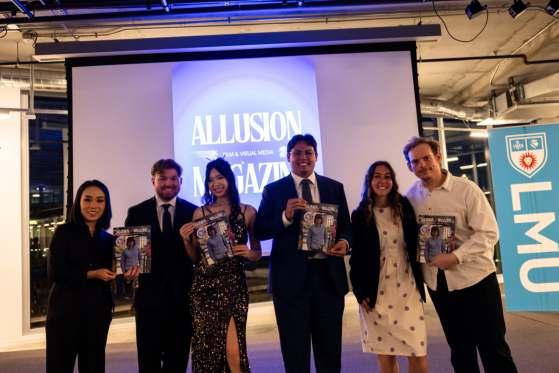
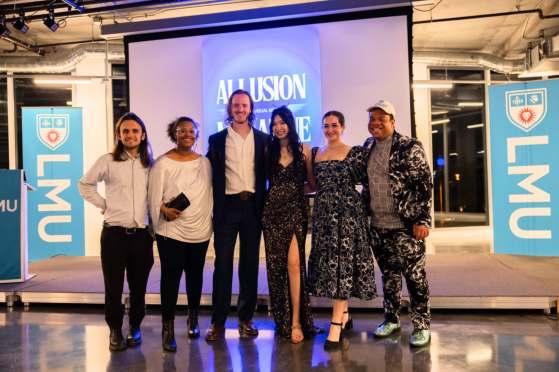
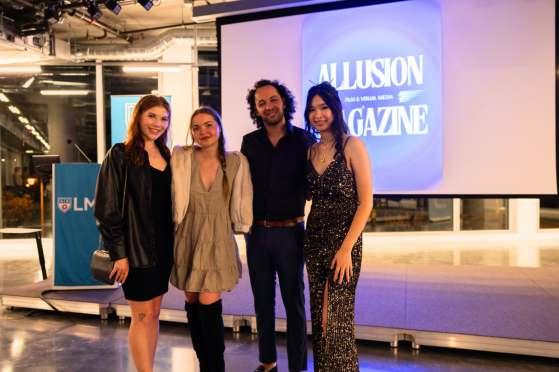
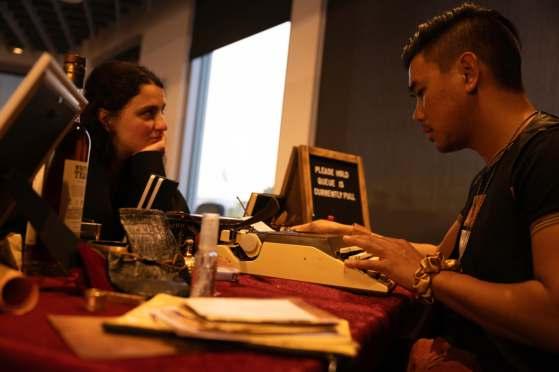






written by: Milla Nguyen
I had the opportunity to interview Nathan Xia, a talented filmmaker and alum of the LMU production program. Our conversation spans many topics: Nathan’s early childhood memories, his craft of blending music and film, and his plans to imprint his mark on the world. Nathan Xia is a rising star to watch. As an experienced writer-director, an actor, and singer-songwriter, he has proven himself to be deeply passionate about the arts. He was born and raised in San Diego, California. Growing up, Nathan always went against the grain because of his tenacity. He never shied away from a challenge. Even when he was told ‘no’ by adults in his life, it made him want to do something more. He said, “I was a mischievous kid. I was the unconventional Asian kid. Not in a malicious way, I just did things that made sense to me.” Later on, he transformed this spirit into leadership skills. In high school, he eventually became student government president and traveled to student leadership conferences as a speaker. He said, “These experiences helped me learn how to effectively lead and inspire people, how to bring out the best in each person, how to collaborate and bring a vision to life. Critical for working as a director later on. When I traveled throughout California, my favorite part was talking to people from all walks of life.”

I asked Nathan if he remembered when he wanted to be a filmmaker. When he was younger, he took piano lessons. His piano teacher was particularly strict and forced all of her students to buy cameras so they could film her hand movements, and replicate them exactly. As a form of rebellion, Nathan deleted all of the videos, refused to copy her, and used his camera to film what he wanted. From then on, he found that filming was a form of selfexpression. He said, “I just made comedy sketches because I loved making people laugh. I would love to shoot something and see their reactions. There’s no greater feeling than to entertain someone with something silly I made.”
Nathan Xia is a Loyola Marymount University alumnus. He attended the production program, the place where he learned from the ground up and discovered more passions along the way. He said, “I got a lot from working with my peers. I shot films outside of the curriculum. Objectively, my early stuff wasn’t good, but it’s a process. Bad became okay. Okay can become good.” Nathan started drafting ideas for his LMU thesis. Soon after, his award-winning short, Adam’s Song, which is distributed by NextShark, Wong Fu Productions, and FilmShortage, became widely popular. He wrote, directed, and starred in the film. Nathan said, “I wanted to make a film that could explain a part of myself. I wanted to showcase a self-destructive character who didn’t understand that his father’s love may have been unspoken but was always there. He just had to realize it. There’s this miscommunication of culture, whether it was with my family, with other Asian kids, or with my own identity.” When it comes to acting, Nathan mentioned that started out acting out of necessity.

He spoke of the casting struggles in Los Angeles, as there weren’t many actors who were specifically Chinese-American and fit the roles he was writing for. Therefore, he had to take up the mantle with Adam’s Song, channeling pieces of his real life into his character. The film kicked off his career. It led him to be signed with his current talent agency. The film’s festival run made it across the United States in cities like Los Angeles, Nashville, Seattle, New York, and more. Even to this day, it serves as an example of what he can do for other various projects. In terms of distribution, he has had a long-standing relationship with the founders of WongFu Productions, Philip Wang, Wesley Chan, and Ted Fu. He said, “They were mentors when I first moved to LA. They read the script early on. I grew up watching WongFu, they inspired me to pick up a camera.” The short can be found on the WongFu channel, which hosts 3.19 million subscribers.
Early in Nathan’s directing career, he made films such as Goodnight America, Oh, Mighty Ocean!, and Chasing Sundance. All of which have had record-breaking viewer stats. Oh, Mighty Ocean! starred Jack Griffo (The Thundermans), Peyton List (School Spirits), and Jacob Bertrand (Cobra Kai). He said, “Jack, Peyton, and Jacob put a lot of effort into preparing for this film as if it were one of their booked roles. This short film was very autobiographical, and it explored my relationship with mental health. We talked extensively about our own experiences and backgrounds.”
Diving into Nathan’s music, he’s gearing up for his upcoming EP release this summer. We discussed creating without boundaries and taking a leap of faith. He remembered sitting in his room during the pandemic, desperate for a sense of hope and inspiration. He began releasing music to overcome his fear of putting himself out there. His current discography is fluid.

He began releasing music to overcome his fear of putting himself out there. His current discography is fluid. He said, “My sound is constantly changing. I did more rock stuff early on, it became indie-rock, and now it’s folk-alternative territory. As an artist, it’s natural to shift. Your responsibility is evolution.” When he’s writing music, he unapologetically writes songs that are deeply personal to him without regard for the audience hearing them. Music is a comfort space for him, and believes that bringing his most authentic self will represent his style the best. He applies the same philosophy to his acting and filmmaking.
My favorite song of Nathan’s, In Between, immediately drew me in as he combined his love of filmmaking, his family, and his music. The music video features his trip to China and rapidly intercuts nostalgic summer memories with his family members. He said, “I haven’t been back to China since I was ten. This trip came about because my grandma has Alzheimer’s. She’s starting to forget more and more. My dad wanted to bring her back to China to jog her memory and give her a great experience. That felt sad to me. I turned to my dad and said, ‘What if I went with you?”. After returning from China, Nathan showed the completed music video to his family. It was an emotional, cathartic moment for the group. Nathan said, “I felt this pride in my culture that was a burden for so many years. The Chinese people have gone through so much and have lost hope throughout the years. The video was a fresh perspective, a romanticized lens of our home. I thought to myself, ‘This was the stuff I was missing when I was in America’”.
We discussed the phenomenon of Asian American youth rediscovering their own respective cultures. In many ways, there’s a seesaw that Asian Americans teeter on in the United States. Many grew up with feelings of shame or embarrassment. With the globalization of Asian media and Asian trends in recent years, Asian culture has become much more popular among the majority. A stark contrast to the past.



He said, “Asian Americans felt like the outliers when they got here. You’re trained in your brain to shy away from your culture when people attach their own ideas of what it means to be Asian to you. It’s the media, too. The fact that Asians are portrayed as nerdy or uncool. Not just Asian people even, I think every kid wants to feel like they have agency over their own life. That they are the main character in their own story.”
With this recurring theme, Nathan wrote and directed a short film titled Flavor of the Month, which will soon be released. He wanted to create a piece that would tackle the idea of representation politics in the filmmaking industry. He acts as the main character, Harrison Huang, a rising Asian-American actor who loses his ground during an audition to another Asian-American actor. By definition, the scarcity mindset refers to the belief that resources (like time, money, opportunities, or success) are limited, leading to a constant fear of not having enough. Especially in a competitive industry like filmmaking within the center of Hollywood, all creatives are taught to prioritize survival. While Nathan has always been a strong advocate for AAPI representation, he also wanted to examine the competitive nature within the AAPI community itself. He said, “When you walk into the audition, you see all the people you’re competing against. The need to win is even stronger, especially when you see someone who looks exactly like you. The way to overcome this is by building a community. We can’t be tearing each other down and fighting for the scraps and crumbs.” Nathan emphasized the importance of unity and rejection of scarce mentality.
One of his most recent shorts, Ayo Check Up! is a film about two men's internalized struggles that manifest in an incredibly toxic 1v1 basketball game. The film premiered at Lebron James’s Uninterrupted Film Festival, powered by Tribeca.
The film is created with a playful, experimental style. The film balances the drama of trauma, quickmoving basketball scenes, and witty banter. The film will be released with NextShark and Omeleto this coming May.
When Nathan is not working, his favorite pastimes are skateboarding, watching and playing soccer and basketball. He also enjoys watching movies in theaters and attending concerts. He also likes to hang out with family, friends, and his girlfriend.
Finally, I asked if there was anyone that he would like to thank for supporting him in his career. He emphasized his family, specifically his mom and dad. He said, “My parents moved here from another country and worked to lay the foundation for my brother and me. I told them I wanted to do a career that was unconventional to our culture, and they still supported me. It’s a privilege to chase my dream. It’s the greatest gift a parent could give their child. Even when I feel like a failure and I’m not doing enough, they’re the first ones to tell me I’m doing just fine. I feel like I can do anything with their unconditional love and support.”





















WRITTEN BY: MILLA NGUYEN
Dustin Muenchow is an editor and director with experience in diverse media. He is no stranger to creating engaging pieces in genres such as comedy, drama, experimental, and even animated media. Even in our interview, Dustin was energetic and passionate about the science behind editing. The more I learned about his story, the more I wanted to know about his future plans. Starting with his childhood, Dustin mentioned that his parents grew up in the Midwest. Afterwards, they moved to California, where Dustin was born. He loves surfing, sailing, and water sports. I asked him if he recalled when he wanted to be a filmmaker. He replied, “I always

knew I wanted to be a filmmaker. My middle school had a broadcast journalism program. At age thirteen, I started learning how to edit on tape to tape. Media 100 was a software I was using that no one knows now.” He compared his dream of being a filmmaker to his life on the water. He said, “When you’re on the water, you’re charting your own course. You’ve got to make your own path.” At the time, he had an internship at the local public access place where he edited a spot for Anime Expo. He also completed a PA gig at Raleigh Studios, where he participated in setting up the DirecTV Championship Gaming Tournament. During the summer, he also created his first documentary that screened at a LA film festival. Once he was steadfast in his passion for filmmaking, he decided he wanted to go to film school. From there, he was later accepted to Loyola Marymount University.




He said, “It was a dream come true. I knew I was lucky to be there. I truly love Loyola and all the collaborators I met there. I worked in lighting and grip. I looked up to the upperclassmen that I worked with.” Dustin spoke of the time he studied abroad in Germany through LMU. He was able to delve deeper into documentary filmmaking and recalled special memories shooting there. He said, “The enduring legacy of LMU is the fact that I still work with many of the people I met when I was a student there. A lot of the 2012 class is still working in the industry. It’s so cool.” During his time at LMU, he also earned a minor in business administration, which helped him hone his skills in every department. Dustin is most known as the editor of the award-winning television pilot, Halfrican American, which won the Special Jury Award at the SXSW film festival. It’s a semi-autobiographical piece loosely based on writer and director Zeke Nicholson. Zeke Nicholson has worked on projects such as Loot, Miracle Workers, and more. The story follows a young, half-Black man who reconnects with his father after not knowing him in childhood. The rest of the episode is from his perspective as he meets his father’s side of the family, whom he didn’t know existed. Dustin said, “The piece is about identity. Fitting in. Finding where you come from. It’s a fun, hard R family comedy. I edited the sequences to the script. Comedy is about the performances. I’m just pulling from the improv, intercutting, and spending time in editorial.”Then, the news came. The team was officially accepted to screen Halfrican American at SXSW, one of the largest film festivals in the world. He recalled, “It was like camp going to South by. Zeke, the crew, and I stayed in one house. It was a lovely, life-affirming event. I’m glad I extended my trip because we didn’t expect to win.” Suited up and dressed to the 9s, Dustin sat with his crew at the award ceremony. Their pilot was the first award to be called. He said, “I gave the most guttural yell. It was cool to get recognition for a comedy. It’s the kind of film I like to make. It’s the line between artful and commercial.” Afterwards, the pilot was accepted into the Aspen Film Festival and the Boulder International Film Festival. To Dustin’s surprise, the pilot also won best short film at the Boulder International Film Festival.



When it comes to editing, Dustin said that his directing and music skills have come in handy. He mentioned that music was always a part of his life, and that different genres of music, such as lo-fi, rock, instrumental, etc., are core in setting the mood. He said, “I believe in the theory that playing instruments is akin to editing rhythm.” His favorite music project he’s directed is a music video for a Japanese artist named starRo. The song was nominated for a Grammy. He emphasized his love for dance choreography and his utilization of projection mapping on the project.
He has also edited commercials and promos for high-level brands such as Netflix, Nike, Nickelodeon, Capital One, Disney World, and more. Dustin elaborated that one of his favorite projects was Funny or Die’s High Science, a MAX original. It was a challenging project that utilized green screen and heavy visual effects, pushing him to his fullest potential. In the Nike brand spot, Nike Running: Seoul to Chicago, he worked with Dirty Robber, a production company that encouraged him to interchange mixed media effects and 35mm photography.
To add to his list of impressive accolades, Dustin has worked extensively with JASH, a comedy community and advertising agency founded by Michael Cera, Tim Heidecker, Eric Wareheim, Sara Silverman, and Reggie Watts. He has edited many different types of projects with the company featuring comedic talent like Norm Macdonald, Beth Stelling, Stephanie Beatriz, and Nicole Byer. He elaborated, "I love working in comedy. It has the perfect mix of working within constraints while still having enough flexibility to really try things and push the medium.



There's so much power in editing with comedy. I feel very lucky to be able to sit in the room and collaborate with some of the funniest people around". After his time at JASH, Dustin continued his journey in comedy. He worked extensively with All Things Comedy, a production company founded by Bill Burr and Al Madrigal.
Further in our discussion, we conversed about the future of editing. Dustin admitted that the strike changed the landscape. On the other hand, most digital editors today can adapt to changing technology. He remains optimistic about the industry’s future and the rising generation of filmmakers. He said, “It’s really neat. I’m delving into the indie filmmaking world more and creating things that I’m excited about. I’m exploring new things.”
In lieu of the future, Dustin recently edited a feature film titled, The Toast, directed by fellow LMU alumni Tom W. Meyers. The film is about a desperate wedding party that scrambles to prevent the drunk Father-of-theBride from giving a disastrous welcome toast. He is also working on children's television show pitch with Johnny Pemberton, known for Fallout and 21 Jump Street.
Finally, I asked him if there was anyone he would like to thank for supporting him in this career. He mentioned his parents. He said, “My parents were so ecstatic for me. I could not have more loving, wonderful parents.”. He added, LMU, Tanner Kling, and Chris Hanada of Retrofit Films. He mentioned they had given him one of his big breaks in his career. Together, the trio edited content for the CW and Cartoon Network.”





Lu Cheng: Composer on the Flash, Arrow, Prodigal Son & more:
Lu Cheng: Composer on the Flash, Arrow, Prodigal Son & more: Crafting Story through Music
written by: Kurtis Williams
written by: Kurtis Williams
In the ever-evolving world of film and television, composers serve as the invisible architects of emotion, weaving together symphonies that elevate stories to new heights. One such master of the craft is Lu Cheng, an emerging composer whose work has graced projects ranging from blockbuster television series to intimate independent films. Lu is a highly skilled composer based in Los Angeles, California. With a deep passion for music,hehasdedicatedhimselftothecraftandhasachievedaremarkablemilestoneby completing a master's degree from the renowned University of Southern California (USC). Having spent over five years working professionally in the film industry, Lu Cheng has honed his talents and expertise in composing music for a variety of projects. His love for music resonates in every note he creates, infusing his compositions with emotion,depth,andcreativity.

When we launched this magazine, I was especially excited to connect with Lu Cheng for this profile. He composed the score for my first short film, She Smiles Back, back when I had just moved to Los Angeles to pursue filmmaking. Even then, I knew he had something special. His ability to craft emotion through music was undeniable. I wanted the world to know about him and his work, and I couldn’t think of a better way than through this interview. It’s an honor to sharehisstory.
Growing up in an immigrant Asian household, Lu’s introduction to music was as much about structure as it was about creative escape. Left to navigate his own world outside of school, he found solace in the piano, an instrument introduced to him at the age of six. However, it wasn’t until a fateful encounter with the enchanting scores of Studio Ghibli films, particularly Kiki’s Delivery Service, Howl’s Moving Castle, and Porco Rosso, that Lu felt the pull to composehisownmusic.
“I had been playing other people’s music for so long, and one day I just thought, ‘Why don’t I try writing something myself?’” he recalled. “I didn’t even realize I wanted to write for a film at first. It just happened naturally.” His journey took a pivotal turn when he attended the University of Southern California’s prestigious music program, anexperiencehedescribesasboth
exhilarating and grueling. “It was chaos,” he laughed. “The pressure of learning, absorbing, and immediately applying what I learned made the whole experience intense, but ultimately rewarding.”
At USC, Lu refined his compositional voice, drawing inspiration from the Romantic and Impressionist eras while infusingmodernrhythmicelementsinto his work. While composers like Joe Hisaishi shaped his early appreciation for melody, his own style took a more rhythmicallydriventurn.
With an impressive résumé that includes work on The Flash, Arrow, and Prodigal Son, Cheng has mastered the art of composing for television. The superhero genre, he explained, relies heavily on recurring motifs that evolve witheachvillain-of-the-weekstoryline.

In contrast, Prodigal Son presented a unique challenge, one that involved unconventional techniques. He said, “We wanted to create something personal and eerie, so we held a barbecue party, kept all the bones, and then recorded the sounds of them cracking, breaking, and snapping,” Lu shared. “We turned those into percussive instruments and digitized them for the score.”
Beyond television, he has composed music for nearly 50 short films, a format that requires precise storytelling within tight time constraints. “The biggest challenge with shorts is finding ways to reiterate a motif without exhausting it,” he explained. “You have only 15 to 20 minutes to create something memorable, but if you overdo it, it becomes repetitive. If you underdo it, it’s forgettable.”
What’s striking about Lu’s approach is not just his technical precision, but his willingness to experiment fearlessly. Whether it's cracking bones for a thriller or shaping the emotional arc of a 10-minute short, he approaches each score with the same intensity and care. In a way, his adaptability is a reflection of the industry itself: fast-paced, everchanging, and unforgiving of complacency. Yet, rather than bending to convention, Lu expands it, challenging how we think about sound and storytelling. For Lu, the process of scoring begins with reading the script twice, back to back, before setting it aside for a week. When he revisits it, he jots down key moments, characters, or objects that linger in his mind. “If something sticks with me after a week, I know it’ll be memorable for the audience,” he said.
He then crafts motifs around those elements, ensuring that his compositions serve both the film’s vision and his artistic sensibilities. His process speaks to a rare blend of instinct and intentionality. In an age when composers often rely on temp tracks and quick turnarounds, his decision to reflect, wait, and distill what matters most showcases a quiet rebellion against speed for speed’s sake, and serves as a reminder that the most lasting music comes from the space between inspiration and discipline.
Currently, Lu is working on the highly anticipated video game Project Vesperi, a sci-fi orchestral score that aligns with his classical training. “It’s exciting to blend orchestral elements with the futuristic feel of the game,” he said. He is also in the midst of composing for a Christmas film, a project that has pushed him into unfamiliar but rewarding territory.
Reflecting on his journey, Lu offers simple yet powerful advice to those looking to break into the industry: “Stop lowballing yourself.”
Above all, Lu cherishes the relationships he has built through his work. “The most rewarding part of this career is the trust filmmakers and game creators place in me to bring their stories to life through music,” he said. When asked who he credits for his success, he doesn’t hesitate: “The women in my life. My mom. My grandma. They’ve always guided me back to the right path.”
With an impressive body of work already under his belt and an eagerness to explore new creative avenues, Lu Cheng is a name to watch in the world of film and game composition. Whether crafting haunting psychological scores or heartwarming orchestral pieces, he continues to push boundaries, proving that music plays an integral part in supporting our stories.


INDUSTRY LEADER AND PROFESSOR OF BUSINESS OF ENTERTAINMENT
INDUSTRY LEADER AND PROFESSOR OF BUSINESS OF ENTERTAINMENT
LYNNETTE RAMIREZ
LYNNETTE RAMIREZ

Lynnette Ramirez is a professor who teaches Business of Entertainment at Loyola Marymount University. She graduated from LMU’s screenwriting undergraduate progr and began at Sean Connery’s Fountainbridge Films, working in development on films Entrapment and Finding Forrester. In 2002, she launched Vida Films, a film production company that produced two independent features: The Blue Hour starring Alyssa Milano and 2 Days starring Paul Rudd and Adam Scott. In 2007, she became SVP of development and production for George Lopez Presents housed at Warner Bros. During her tenure with Lopez, she produced several projects, including the Nickelodeon hit original movie Mr. Troop Mom. She is currently the President of Bassett Vance Productions, where she isn't just creating content - she's creating opportunities. She’s also a writer, having sold romantic comedy screenplays to Walt Disney and Lionsgate Studios.

Lynnette Ramirez was born in the San Gabriel Valley and is a native of Southern California. Not only is she the esteemed President of Bassett Vance Productions (created by awardwinning actors Angela Bassett and Courtney B. Vance), but she has also proven herself to be a top-notch creative with a keen eye. She said, “I believe the heart of storytelling is the human condition. The ability to see people’s choices and their different paths. It’s part of the business.”
At the beginning of her story, Ramirez didn’t realize she wanted to work in Hollywood until she was a young adult. When she applied to LMU for college, she ended up choosing screenwriting. During her time there, she learned how to write for a visual medium.


At the same time, she interned with Jodie Foster’s company and realized what it meant to fill the role of a creative producer. When people think of producing, they imagine someone who’s always on set or someone who is working on paperwork in the office. Seven months after graduating, she landed a job at Sean Connery’s Fountainbridge Films. Her aspirations had already shifted towards creative producing, the role of overseeing all aspects of production while also lending her eye to the story’s development.
In 2003, she founded a production company called Vida Films in order to create more independent films. While others went on to graduate school, she taught herself the business skills she needed to succeed. In her spare time, she wrote scripts. She was able to sell her scripts to studios and worked as a script analysis consultant for other writers. When she’s reading others’ projects, she looks for what she calls “the integrity of the theme” within the story. She asks her team, “Is this something we can speak to? What are we trying to say? Does this film move the conversation forward in culture?” She is responsible for communicating with both sides of the table: the filmmaker and their vision, as well as the other studio executives invested in the project.
Currently, Ramirez serves as the President of Bassett-Vance Productions and she’s in her fifth year of working at the company. Prior to this, she worked with many actor-driven labels, such as George Lopez’s and Ian Anthony Dale’s respective companies. Her day-to-day life includes hearing screenwriters’ pitches, meeting agents and executives, and developing buyer



relationships. She runs a fully-fledged team that evaluates projects on the company’ On top of that, Ramirez can multi-task and pivot when a last-minute change to produ happens. During post-production, she’s responsible for giving notes and organizing the process. While Bassett-Vance isn’t a production company that solely focuses on race and culture, she is a leader and president dedicated to portraying three-dimensional sides of characters who are ingrained in their cultural backgrounds. She elaborated, “The joy of being a creative producer is picking projects we want to see. Picking projects, we’re passionate about. I think the actual story is one thing. Another thing is the story we’re telling as the creative team behind it. If I can’t say why we’re telling this story, then it might not be for us.”

Lynnette Ramirez also teaches at Loyola Marymount University, specifically the Business of Entertainment course. When we discussed her teaching arc, she said, “You could follow all the rules and pick what works best for you, but storytelling is about unearthing your voice and point of view. As a teacher, I want to bring a real-world perspective.” When she was a student at LMU, she recalled taking a business class. Her professor worked in the industry and often brought in guest speakers, which helped her see the importance of building realworld experience. In the Business of Entertainment course, Ramirez encouraged her students to read the current trades, form industry connections through student final projects, and gain more confidence when pitching. Ramirez remarked, “The industry is constantly evolving, and I’m evolving in it. You can’t fully be prepared for anything, but there are things you can learn that can help you overcome challenges. We look at case studies. We hear the stories from guest speakers. I want to be that resource at LMU.”
Another vital aspect is diversity in students’ education. As a female professor, Ramirez brings her lived experiences in the industry and the world around her when she’s not working. The LMU student body reflects this diversity, as students come from all different backgrounds. Ramirez wants to amplify this even further.
During the conversation, I mentioned that there was a large wave of students graduating from top-notch film schools who are not able to be fully employed in the film industry. This could be due to the strike, the fluctuating economy, and a number of other factors. When specifically talking about LMU, Ramirez mentioned that balance is key. The balance of LMU faculty training students for the real world is one goal. The other goal is for students to find their own determination and grit to succeed. Surely, in order to work in the film industry, creatives must find resilience.



Next, I asked Ramirez how she continues to uplift Latinx creatives in the workplace and in her personal life. She said it has always been a part of her story. Her father is Mexican and her step-father is Puerto Rican, so her cultural roots are embedded in who she is. Instead of calling it a “mission”, she calls it a “community.” Since there were so few Latinx female creatives at first, she banded together with others to create an even larger group. When Ramirez first interviewed for her position at Bassett-Vance, Angela Bassett told her she enjoyed the fact that Ramirez worked at POC-driven companies. Growing up in the San Gabriel Valley, Ramirez recalled how diverse her community was.

Outside of work, she loves to travel. She’s vastly curious about how people live across the world and what stories can be told about these different cultures. She also serves on a couple of advisory boards. One is Storytellers & Scholars; a non-profit organization that helps creatives create data-driven research projects. The founder has worked in the film industry and holds a degree in psychology from UCLA. The other is Unusual Suspects, a non-profit that helps youth creatives develop their playwriting skills across Los Angeles. Essentially, storytelling is the heart of everything she does.
Ramirez has exciting plans for the future while she continues her role as President of BassettVance. She will continue to open doors for diverse creatives, develop authentic stories, and lend her expertise in an ever-changing industry.
She offers valuable advice to students. She elaborated, “A good leader is someone who makes good decisions and can also adapt. If the decision is wrong, they must be able to make decisions that can correct it. And not stop. This spirit of keep going. You’ll never be fully prepared. Still, you have to seize the moment. By doing that, you can get ahead.”
I asked her if there was anyone that she would like to thank for supporting her throughout her career. She said, “My boss, Courtney B. Vance, is always willing to make and learn from mistakes. We don’t always have to be the smartest people in the room. I value that because of my parents, who do the work and have integrity. No matter how many successes or failures they had, they never lost sight of their integrity and humility.”




written by: Milla Nguyen


Patricia K. Meyer, a screenwriter, producer, and educator, has sold and written numerous feature screenplays, from dark comedy to true crime drama, for Martin Scorsese, Robert De Niro, Jerry Weintraub, and all the major studios. In addition, she has written network miniseries and movies-of-the-week, as well as an original drama pilot for CBS. Meyer launched her career by optioning Gloria Naylor’s novel, The Women of Brewster Place, which she produced as an ABC 4-hour miniseries starring Oprah Winfrey, and which earned an
Emmy® nomination and an Image Award. Next, she executive produced Nora Ephron’s feature directorial debut, This is My Life, for 20th Century Fox, based on the Meg Wolitzer novel which she optioned. She also developed and produced seven network movies starring Kirk Douglas, Kelsey Grammer, Corbin Bernsen, among other stars. After a decade teaching screenwriting at the AFI Conservatory, Meyer has enjoyed serving for nine years as Associate Clinical Professor, four years as Graduate Director of MFA Screenwriting, and one year as Assistant Professor at Loyola Marymount University’s School of Film and Television.
Patricia Meyer is a Los Angeles native, born and raised in the San Fernando Valley. When we discussed her childhood, she










mentioned that her father fulfilled his dream of raising his family in the countryside. In his early years on the farm, he and Meyer’s mother raised chickens and gave away eggs to their neighbors. At the same time, he worked as a Hollywood producer, on Dragnet, the first true crime television series, being his big claim to fame. But Meyer isn’t just the second generation to work in the entertainment industry. A dozen years earlier, her maternal grandfather Nathan J. Blumberg was summoned by Carl Laemmle, who founded Universal Pictures, to help him save the studio when business was down. Blumberg served as President and CEO of Universal from 1938 to 1960. She said, “It’s in my blood to be a storyteller. Since I could pick up a pencil, I knew writing was my destiny. My dad begged me to go to law school and avoid the Hollywood rollercoaster ride, but I had no choice; the business chose me.”
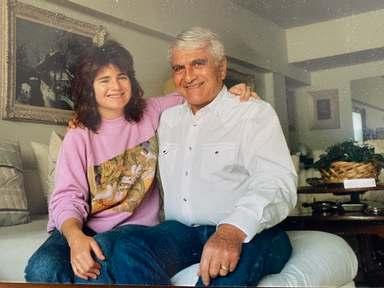

Her journey from living on an eight acre farm with her family to having legendary stints in the film industry and later being a professor at several universities illuminates how multifaceted she is. As a young adult, she developed her writing, but first as a fiction writer and a literary scholar. She plunged into creative and academic writing while she earned a BA in History and Literature from Harvard University and then an MFA in Fiction Writing from Boston University. In the end, she realized the literary life would not pay her rent. So her brother, an agent at William Morris Agency, gave her a pile of scripts to read for under-thetable pay. Doing coverage taught her a new form of storytelling. Suddenly, she set her sights on becoming a screenwriter. She hacked away at the craft, writing for practice again and again, until she finally began to master it.

In the meantime, she put food on the table by working for producers, doing coverage, and making dinner reservations, first at Warner Bros., then TriStar, then Disney. After a few years of learning screenplay development, she was restless, eager to launch her writing and producing career. It was only a matter of time before fate struck. On a flight back from Boston, she read the novel, The Women of Brewster Place, an allBlack female ensemble drama and fell in love with it. She asked an agent friend, at the nowdefunct agency, Triad, to call Viking-Penguin to secure an option for her. He called back and said the option was hers, but it would cost $3,500. As a $500-a-week story editor, she had to borrow the money from two kind college friends. Then the stars aligned as they sometimes do in Hollywood: Oprah Winfrey called her, wanting to partner with her; the subsidiary rights agent at Viking did not know that Oprah was at the top of a waiting list for the rights to the novel. At just 26 years old, Meyer had the leverage to negotiate a six-figure producing deal and collaborate with Winfrey on The Women of Brewster Place. The fourhour miniseries received an Emmy® nomination and an Image Award for Outstanding Miniseries. She said, “Grandpa was long gone, but I ended up shooting this show on the Universal lot, where he worked as CEO. It was such a wonderful full circle experience. During a night shoot on the lot’s New York Street, I looked up at the stars and knew Grandpa was beaming down at me, proud.”



Meyer worked as a producer for the next decade, turning books into films. She was signed with Writers and Artists Agency, but with another stroke of luck, her new agent was hired away by Creative Artists Agency. CAA approved the agent to take three of her clients with her, and Meyer was one of them. The momentum didn’t stop there. She optioned a script to Jerry Weintraub, a producer at Warner Bros. She sold her first feature pitch in the room at Paramount. Then, her work was noticed by Martin Scorsese. Together, they worked on two true crime drama features for Touchstone Pictures. Later on, she worked with Robert DeNiro’s Tribeca Productions on a biopic about a man who survived the French Foreign Legion. Due to her having the rights once again to a coveted novel, she executive produced Nora Ephron’s This is My Life, Ephron’s directorial debut. This was after Ephron directed You’ve Got Mail and Sleepless in Seattle.
Even when producing, Meyer never lost her passion for screenwriting. When I asked about her current writing portfolio, she said that she continues to write crime thrillers, as well as action comedies, and romantic comedies. Recently, she received a grant from LMU and created a podcast that is about to launch: “Daughters and their Fathers: It’s Complicated” (https://patriciakmeyer.net/podcast.html) explores that seminal relationship that she has written about. She said, “I want to give voice to this relationship. There hasn’t been a lot of discussion about fathers and daughters. I want to address this more deeply.” Along with her new podcast, she has published a personal, comic-tragic essay, “Big Red Flag,” about her middle-aged woman dating debacles. She plans on adapting it as a rom-com feature over the coming summer. She said, “People are complicated. We’re all flawed. The most compelling stories dig into a character’s damage, and, unlike in real life, we can ensure that they evolve and heal in the end.”
When it comes to advice on pitching for students, she said, “You must be brief and engaging. Hook them into your story with specificity but with only the broad strokes. Learn how to pivot; be conversant about all your projects. Make sure to rehearse. Sometimes the room of execs won’t tell you who’s going to be in the pitch meeting; sometimes they won’t tell you how many writers you’re competing against. Be prepared and be confident. Even if the pitch doesn’t work, you must continue to believe in your story and never apologize for your passion and your vision.”
Meyer and I discussed how much the entertainment industry has changed. She acknowledged that the economic model for screenwriters to make a living has changed, not for the better. On the upside, the industry has become more diverse and more welcoming of niche stories that aren’t always commercial for the mainstream market. She believes that with their unique stories and world views, LMU screenwriters will find their places in the industry. But as her own career has proven, the path may be circuitous. “There is rarely a straight path to your dream career,” she said.
When I asked Meyer about her philosophy on screenwriting, she emphasized the importance of practice, patience, and rewriting; she tells her students it takes numerous drafts before a script works on all its essential levels. When asked about life balance, she said, “I have three happy places. One is sitting alone at home and writing. Two is the writers workshop with my students. Three is spending time with my son.” (“By the way,” she said, with a twinkle in her eye, “my son, Joey Rosenblum is now a Lion, too: He’s the Director of Player Development for LMU’s Division 1 baseball team.”) In terms of teaching, she is grateful that her MFA enabled


her to launch a second career; more importantly, “it got me out of the Hollywood bubble and allowed me to give my hard-earned knowledge to hundreds of developing screenwriters over the past twenty-five years.” Her teaching career started at Chapman University. She then spent a decade at AFI Conservatory, teaching screenwriting and helping guide fellows’ thesis projects.
Ten years ago, she joined the Screenwriting faculty at Loyola Marymount University. About her four years serving as Graduate Director, she said: “I loved working with our Chair, Karol Hoeffner, to continue to evolve the program, keeping up with the industry, and ensuring our students would be best prepared and trained for a career in their chosen profession.” Together, they weathered the COVID quarantine, which wasn’t easy for anyone. But leading a program during such a challenging time had many rewards. Even now as an assistant professor, she maintains the shared LMU mission of “educating the whole person.” “My writing students aren’t just writers; they are complex individuals from a wide array of backgrounds, and I love helping them find their unique voices so they can tell the stories only they can tell.” During the interview, Meyer walked me around her office, where she pointed at numerous framed photographs of LMU cohorts over the years. She thinks of her students as family.
Finally, Meyer would like to thank and acknowledge several people in her life for supporting her through the ups and downs of being an entertainment professional. She said, “My son, Joey, is my greatest production. Like teaching, being a parent opened my heart up and allowed me to give back in ways I couldn’t imagine.” She beamed talking about Joey, calling him generous and kind-hearted, and, thankfully, inherited her persistence and focus. She also thanks Frank Von Zerneck and Bob Serner who mentored her in producing. She is also thankful to her LMU colleagues, especially Jeffrey Davis, Beth Serlin, Karol Hoeffner and David Clawson: “When they interviewed me for the clinical assistant professor position,” she said, “I honestly felt that I’d found my new home, and a new family. They hired me, and I’m so grateful for that.” Last, she expressed her appreciation for her three big brothers and, of course, her parents. “My mom, a deputy mayor for Tom Bradly, gave me my passion for service and community; and my dad gave me my drive to tell stories, teaching me that a professional storyteller doesn’t wait for inspiration; no, you just have to buckle down and keep writing.”

written by: Jacob Chandler
Multi-Emmy Award-Winning TV Producer, Best-Selling Thriller
Novelist, TV Writer, Screenwriter, Playwright, Director, Documentary Filmmaker, Disc Jockey, History Buff, TV Historian, Full-Time Professor, Lecturer, and Journalist. If the name Gary Grossman popped into your head at any point throughout that list, you’d be right. As one of the most diversely experienced professionals in the entertainment industry, LMU SFTV
Writing for the Screen lecturer Gary Grossman proves that there’s no onewaytotellastory.

IopenedZoomtheafternoonofour interview, trying to remember how to break the ice over video, especiallybecauseIhadn’tseen






Grossman since last semester. As soon as he joined, I was back in his class: cracking jokes, learning something new, and enjoying the conversation. That’s the thing about him, he’s an innate storyteller. So, it felt naturaltostartbyaskinghimwhoheis.
“InmydaysasanAMradiorockdiscjockey, I like to say it was the best $1.33 per hour I’ve ever earned. Pure fun. That’s what brought me into the business. But there’s a direct connection to teaching. I think teaching is performing in an important way, too. It’s holding an audience. It’s communicating and passing along what we know. And personally for me, it’s a way for metosharewhoIamnow.”


Before becoming an Emmy-winning producer and best-selling novelist, Gary Grossman was simply curious. Asakid,helistenedtoglobalstations on a shortwave radio gifted by his parents. Hearing voices from Moscow,Cuba,andChinaopenedhis eyes to the world. But it was the political thriller book and movie Seven Days in May that truly ignited hisstorytellingflame.
“IsupposeitstartedwhenIcreateda class newspaper in fifth grade. A few years later, I became a ham radio operator, reaching out to the world communicating in Morse Code. However,IrealizedthatnotonlydidI wanttohearbroadcastsfromaround the world, I wanted to broadcast myself; and get heard over the airwaves.”
At 15, Grossman wrote a letter to his hometown Hudson, New York radio station, advocating for rock music andschoolnews.Thefollowingweek, he was on the air—biking after class to spin records for the station. “To make a long story short, I got my voiceoutthere!”

With years of broadcast experience through high school and at Emerson College,Grossmanbecameasummer reliefengineeratWBZ-TVinBoston.

He quickly worked his way up, producing and editing documentaries on 16mm film. He even shared an office with Vin Di Bona—future creator and Executive Producer of America’s Funniest Home Videos. Keeping friendships near and dear, Grossman just completed collaborating on Di Bona’sforthcomingautobiography.
Before leaving Boston, Grossman made one of those important career switches that added to his overall experience. He began teaching at Emerson College while writing newspapers articles, he served as a TV columnist and critic for the Boston Herald American, freelanced with the Boston Globe, and contributed to the New York Times. But soon, he felt the pull to create his own work. Moving to California, he contacted people he’d written about in a newspaper article and becametheDirectorofDevelopment for a network TV production company.
After a year learning the business there, he started a production company with a friend. Their first pitch was to Showtime. Pitch after pitch in the room, nothing landed. “We finished and began to leave, thenspontaneouslyatthedoor,I



stopped and said, ‘Wait, wait, wait. I have one more idea.”My business partner didn’t know what I was talking about. I didn’t know the idea. We’d exhausted what we’d come in with.ButImadesomethinguponthe spot. ‘We want to produce a TV a reunion of these great folk singers from the 50s and 60s. In twenty seconds, we made the sale for The Folk Music Reunion. My first Hollywoodshowever.
Later that year, Grossman's career advancedashejoined Entertainment Tonight asSpecialProjectsProducer, Associate Director, and eventually Producer of the International shows —hired, in a full-circle moment, by thenExecutiveProducerVinDiBona. At the same time he taught broadcastjournalismclassesatUSC.


After six years at ET, ABC brought Grossman to New York to create, Executive Produce, and launch Day’s End,alivelate-nightshow.Returning to Los Angeles, he served as Supervising Producer of two more ABCseries, America’sFunniestHome Videos and American Detective, for NBC, I-Witness Video, and with EP’s David Lynch and Mark Frost, Grossman produced the documentary series American Chronicles.
Grossman’s major industry impact came when he co-founded Weller/Grossman Productions with former Entertainment Tonight host Robb Weller. Their company produced over 10,000 shows for over 40 networks. Over 18 years. he earnedtwoCableACEAwards,a


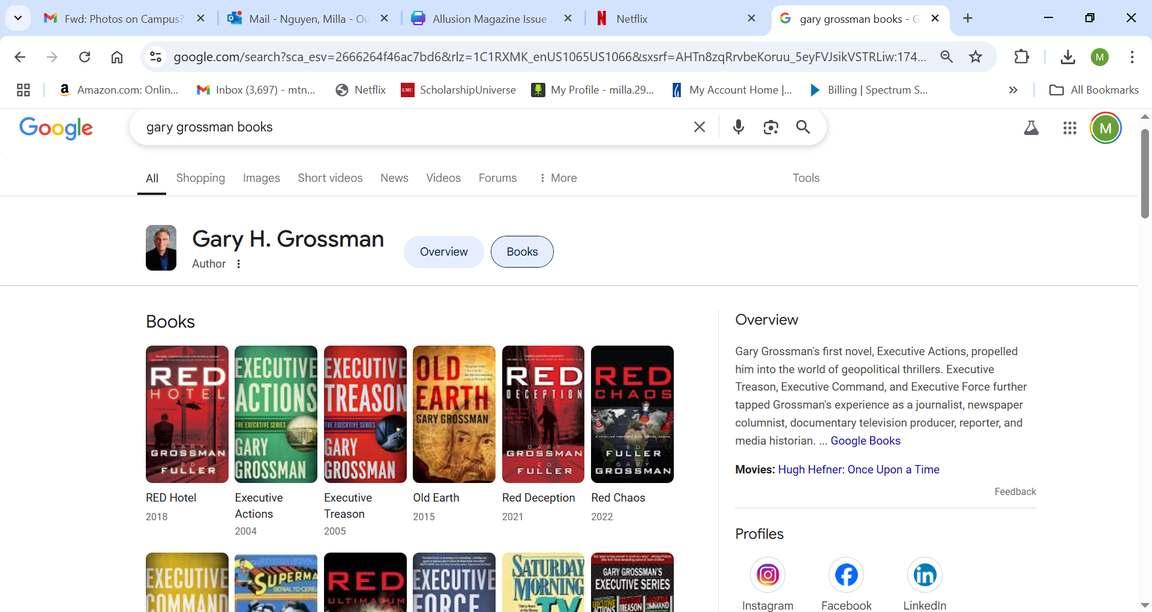
their production of Healing the Hate contributed to the awarding of the Governor’s Emmy to USA Network for Exemplary Programming. In all, more than seventy-five national and international honors went to Weller/Grossman Productions.
During my research, I found a massive listing of shows produced for the History Channel under his IMDb, so it was only right that I asked if he’s a history nerd.
“I am. I absolutely am. And the IMDb is not even complete. I’ve got to add more to it. Producing so many of our documentaries was like developing a master’s thesis because we were digging down, talking with people, and learning about things that we didn’t know, and then finding ways to explain it, and pass it on visually and entertainingly to people.”
With such a broad range of experience, I asked where he feels strongest in the creative process. In TV, without hesitation, he pointed to the edit bay— spotting moments, shaping rhythm, and taking things to the next level. Still, he thrives on collaboration and applauding others’ great work.
Lately, he’s been deep in the writers' room, his novelist writing room, working on Red Succession, the latest in his Red Hotel series. He coauthors the thriller series with Ed Fuller. Their most recent release, published in February, was Red Ultimatum. Before that, Red Hotel and Red Deception. His career as an international political thriller writer has also included five other award-winning novels. Awaiting publishing, but already optioned as a film by Netflix, is The Midas Touch, recently optioned by Netflix. For Grossman, telling history is essential. He’s written two b Superman: Serial to Cereal and Saturday Morning TV: 30 Years of the Shows You Waited All Week to Watch.



But discussing his TV career brought up a powerful personal story.WhilepitchingtotheHistory Channel in New York, someone in the meeting asked, “Do you think we’re running out of history?” Grossman replied, “Who knows what’s going to happen tomorrow? There’ll always be history ready to bemade.”
The next day was September 11th, 2001.
The morning of the attack, he and Robb Weller had a meeting scheduled at MSNBC, then in New Jersey. Their subway route would have taken them right under the World Trade Center. Suffice it to say,thatmeetingdidn’thappen.
That memory has lingered and it became the seed of Executive Actions, his first political thriller, about sleeper plots incubating in silence—untiltheydon’t.
When it comes to teaching, Grossman said, “I teach to share,”. “Iteachbecauseitkeepsmesharp. I get energized seeing the quality of talent coming up. My students’ experiences viewing, reading, and seeing things are different from mine. My, LMU students, keep me relevant and teaching absolutely

Finally, I asked if there was anyone hewouldliketothankforsupporting him in this career. He gratefully mentioned Jeffery Davis, the former Screenwriting Chair of LMU’s Graduate School of Film and Television for leading him to LMU. He also thanks would like to thank Star Trek creator Gene Roddenberry who was his mentor for many years, and Vin Di Bona who remains is a closefriendandcollaborator.

He is inspired by his wife, Helene, a formerTVproducer/writerandnowa short story writer, as well as a reporter and food critic for The Larchmont Chronicle in Los Angeles. His daughter Sasha is a top movie and TV makeup artist who has spoken in his classes, and his son Zach, a screenwriter, and Jake, a set designer who’s making a career turn intolawenforcement.
Gary Grossman rounded off the interview by underscoring , “It’s an honor to be among such exceptional storytellers at LMU – those experiencedinthefacultyranks,and those coming up every year as students. Everyone keeps me sharp. They have me constantly looking forward to tomorrow. And who knows what the next chapter of my exciting life will be? Maybe even anothershiftbackasDJ.”

Once more, I want to reiterate a tremendous thank you to everyone who is a part of this process. The journey has not been easy but that’s what makes it rewarding and special. We are committed to making a magazine that shines a light on filmmakers of all backgrounds. We allude to our own stories.
EDITOR IN CHIEF + FOUNDER
MILLA NGUYEN
GRAPHIC DESIGN BY:
MILLA NGUYEN
FACULTY ADVISOR
WEIKO LIN
DIRECTOR OF VISUAL MEDIA
EVAN ODINSOFF
DIRECTOR OF CONTENT
KURTIS WILLIAMS
DIRECTOR OF EVENTS
ANNA LEI
BUSINESS & DATA CONSULTANT
ANUSHA NATARAJAN
LOYOLA MARYMOUNT FACULTY
LYNNETTE RAMIREZ
PATRICIA K. MEYER
GARY GROSSMAN
JACOB CHANDLER
MARIA MURPHY
ANUSHA NATARAJAN
KURTIS WILLIAMS
PHOTOGRAPHY UNIT + CREDITS
EVAN ODINSOFF
MICHAEL KOKORINE
VIDEOGRAPHY UNIT
EVAN ODINSOFF
MICHAEL KOKORINE
LOYOLA MARYMOUNT UNIVERSITY
LMU SCHOOL OF FILM AND TELEVISON
LMU ITS STUDIO
MICHAEL SITNIKOV
OUR READERS
AMANDA OVERTON
RIPPIN SINDHER
ARCHIE PANJABI
JAMIL AKIM O’QUINN
ELIZABETH AI
NATHAN XIA
FIORI CARMEN
DUSTIN MUENCHOW
LU CHENG
